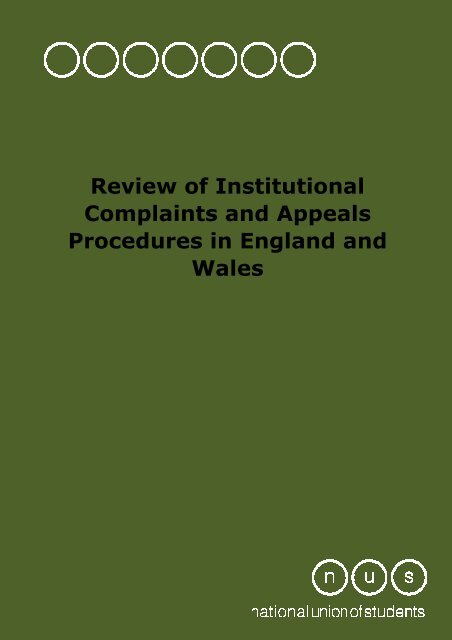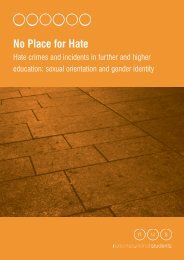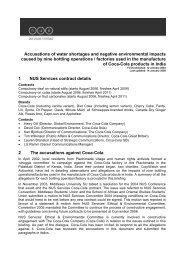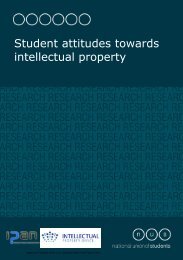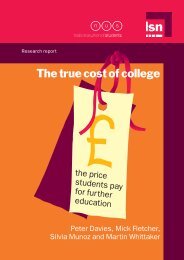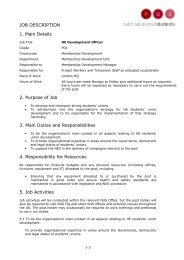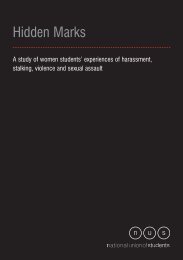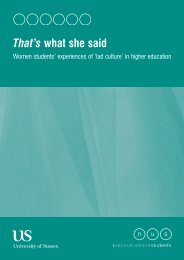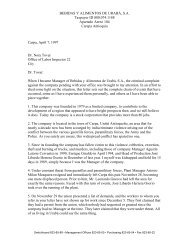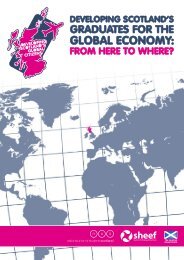Review of Institutional Complaints and Appeals Procedures in ...
Review of Institutional Complaints and Appeals Procedures in ...
Review of Institutional Complaints and Appeals Procedures in ...
Create successful ePaper yourself
Turn your PDF publications into a flip-book with our unique Google optimized e-Paper software.
<strong>Review</strong> <strong>of</strong> <strong>Institutional</strong><br />
<strong>Compla<strong>in</strong>ts</strong> <strong>and</strong> <strong>Appeals</strong><br />
<strong>Procedures</strong> <strong>in</strong> Engl<strong>and</strong> <strong>and</strong><br />
Wales
Contents<br />
Page<br />
List <strong>of</strong> recommendations 2-4<br />
Foreword 5-6<br />
Background <strong>and</strong> QAA Precepts from Code <strong>of</strong> Practice 7-9<br />
Methodology <strong>and</strong> acknowledgements 10<br />
Awareness <strong>of</strong> procedures 11-13<br />
Informal procedures 14-20<br />
Formal procedures 21-29<br />
Complet<strong>in</strong>g the circle – feed<strong>in</strong>g back to students <strong>and</strong><br />
students’ unions<br />
30-31<br />
Perceptions 32-33<br />
Annexes 34-42<br />
Annex 1: List <strong>of</strong> <strong>in</strong>stitutions respond<strong>in</strong>g to the NUS survey 34<br />
Annex 2: NUS Survey 35-42<br />
List <strong>of</strong> charts:<br />
Chart A: How aware would you say students are <strong>of</strong> the compla<strong>in</strong>ts <strong>and</strong> appeals<br />
11<br />
procedures at your <strong>in</strong>stitution?<br />
Chart B: How <strong>of</strong>ten does the <strong>in</strong>formal procedure resolve the issue? 16<br />
Chart C: Does your <strong>in</strong>stitution always adhere to this time-limit? 22<br />
Chart D: How widespread do you th<strong>in</strong>k students not mak<strong>in</strong>g compla<strong>in</strong>ts due to<br />
26<br />
fear <strong>of</strong> damag<strong>in</strong>g their relationship with their tutor is?<br />
Chart E: Does your <strong>in</strong>stitution give adequate <strong>and</strong> timely <strong>in</strong>formation about the<br />
27<br />
OIA?<br />
Chart F: Do you consider your <strong>in</strong>stitutional compla<strong>in</strong>ts procedure to be<br />
32<br />
transparent, fair <strong>and</strong> just?<br />
1
List <strong>of</strong> Recommendations<br />
There are a series <strong>of</strong> recommendations throughout the report which we would ask students’<br />
unions to raise with their <strong>in</strong>stitution <strong>and</strong> for organisations such as the Office <strong>of</strong> the<br />
Independent Adjudicator, the QAA through its Audit process, <strong>and</strong> bodies such as the Academic<br />
Registrars’ Council, to address.<br />
Awareness <strong>of</strong> procedures<br />
Recommendation 1: Institutions should review how they publicise their procedures to<br />
students mak<strong>in</strong>g them more user-friendly <strong>and</strong> easier to f<strong>in</strong>d on the <strong>in</strong>stitutional website or<br />
h<strong>and</strong>books.<br />
Recommendation 2: Institutions should rem<strong>in</strong>d students about appeals procedures <strong>and</strong><br />
extenuat<strong>in</strong>g circumstances prior to each exam period to ensure that students are aware <strong>of</strong> the<br />
procedures <strong>and</strong> so that they raise them as early as possible.<br />
Recommendation 3: When a student makes a compla<strong>in</strong>t or academic appeal they should be<br />
provided with additional <strong>in</strong>formation about the process. This should <strong>in</strong>clude how long it would<br />
usually take to be resolved <strong>and</strong> more detail on the additional <strong>in</strong>formation needed as well as<br />
the importance <strong>of</strong> the appeal deadl<strong>in</strong>es.<br />
Recommendation 4: All compla<strong>in</strong>ts <strong>and</strong> appeals procedures should be reviewed to ensure<br />
that they are written <strong>in</strong> pla<strong>in</strong> English <strong>and</strong> easily accessible to all students.<br />
Recommendation 5: The sector, supported by the OIA <strong>and</strong> the Academic Registrars Council,<br />
should develop a model procedure that <strong>in</strong>stitutions could use as the basis for their procedures.<br />
Informal procedures<br />
Recommendation 6: Institutions <strong>in</strong>vestigate the use <strong>of</strong> mediation as part <strong>of</strong> their procedures.<br />
Recommendation 7: Institutions should consider the <strong>in</strong>troduction <strong>of</strong> an <strong>in</strong>dependent<br />
ombudsman on campus, <strong>and</strong> what their role would be <strong>in</strong> discussion with their students’ union.<br />
Recommendation 8: That there is a fixed timeframe for the <strong>in</strong>formal stage, that students are<br />
<strong>of</strong>ficially told when that stage has f<strong>in</strong>ished <strong>and</strong> that they are referred on to the next stage as<br />
appropriate. Students should also be <strong>in</strong>formed at the outset that what is happen<strong>in</strong>g is the<br />
<strong>in</strong>formal stage.<br />
2
Recommendation 9: That <strong>in</strong>stitutions run additional workshops on <strong>in</strong>formal resolution <strong>of</strong><br />
compla<strong>in</strong>ts <strong>and</strong> that the OIA identify ways <strong>of</strong> best shar<strong>in</strong>g practice about <strong>in</strong>formal resolution<br />
across the sector.<br />
Recommendation 10: That records are kept <strong>of</strong> the number <strong>and</strong> type <strong>of</strong> <strong>in</strong>formal compla<strong>in</strong>ts<br />
<strong>and</strong> reported to the <strong>in</strong>stitution centrally alongside the statistics <strong>of</strong> the formal procedures.<br />
Formal procedures<br />
Recommendation 11: All staff that deal with compla<strong>in</strong>ts <strong>and</strong> appeals procedures should<br />
receive tra<strong>in</strong><strong>in</strong>g from their <strong>in</strong>stitution, supported as appropriate by the OIA, <strong>and</strong> that this<br />
should be extended to academic staff, especially if they are also personal tutors.<br />
Recommendation 12: If an <strong>in</strong>stitution does not adhere to its own timetable then it should<br />
provide a detailed explanation why not.<br />
Recommendation 13: All compla<strong>in</strong>ts <strong>and</strong> appeals should be dealt with with<strong>in</strong> three months<br />
<strong>of</strong> it be<strong>in</strong>g lodged with the <strong>in</strong>stitution. In the small number <strong>of</strong> cases where the student believes<br />
that the <strong>in</strong>stitution is dragg<strong>in</strong>g its feet, <strong>and</strong> the student has met the deadl<strong>in</strong>es, they should<br />
also be able to go straight to an external body – possibly the OIA.<br />
Recommendation 14: <strong>Institutional</strong> compla<strong>in</strong>ts <strong>and</strong> appeals procedures should not have more<br />
than four stages. These could <strong>in</strong>clude an <strong>in</strong>formal stage, a formal stage that may <strong>in</strong>clude<br />
mediation, <strong>and</strong> an appeals stage.<br />
Recommendation 15: Institutions should make explicit that they will respond quickly to any<br />
cases where there is a break-down <strong>in</strong> relationship between the student <strong>and</strong> the person they<br />
are compla<strong>in</strong><strong>in</strong>g about on the basis <strong>of</strong> their compla<strong>in</strong>t.<br />
Recommendation 16: If students have concerns about whether the procedures has been<br />
effectively followed at an early stage <strong>of</strong> the process they should be able to raise this at the<br />
time, rather than hav<strong>in</strong>g to wait until they reach the OIA.<br />
Recommendation 17: There should be clear <strong>in</strong>formation on what evidence is required by, or<br />
acceptable from, the student as part <strong>of</strong> the compla<strong>in</strong>ts <strong>and</strong> appeals procedures. There should<br />
also be greater clarity about both the burden <strong>of</strong> pro<strong>of</strong> <strong>and</strong> st<strong>and</strong>ard <strong>of</strong> pro<strong>of</strong>.<br />
3
Recommendation 18: Students should be given the option <strong>of</strong> present<strong>in</strong>g their case <strong>in</strong> person<br />
if they want <strong>and</strong> also to have support from a friend or students’ union representative if<br />
requested.<br />
Complet<strong>in</strong>g the circle – feed<strong>in</strong>g back to students <strong>and</strong> students’ unions<br />
Recommendation 19: Institutions should make <strong>in</strong>formation available about the number <strong>of</strong><br />
compla<strong>in</strong>ts <strong>and</strong> appeals to students’ union, both the overall number <strong>and</strong> those upheld <strong>in</strong> full or<br />
<strong>in</strong> part. This <strong>in</strong>formation should also <strong>in</strong>clude the data about compla<strong>in</strong>ts <strong>and</strong> appeals concern<strong>in</strong>g<br />
all the qualifications that they accredit, even if it is delivered <strong>in</strong> an FE college or overseas.<br />
Recommendation 20: Institutions should also <strong>in</strong>clude <strong>in</strong>formation about their response to<br />
compla<strong>in</strong>ts, such as what they have done to review the procedures.<br />
Recommendation 21: That the OIA <strong>in</strong>forms the students’ union at the <strong>in</strong>stitution <strong>of</strong> all cases<br />
referred to them where the students’ union has supported the student through the process.<br />
The OIA should also suggest to students that did not receive support from their students’<br />
union they may want to <strong>in</strong>form the students’ union <strong>of</strong> the outcome <strong>of</strong> their case to prevent<br />
similar cases <strong>in</strong> the future.<br />
Perceptions<br />
Recommendation 22: That <strong>in</strong>stitutions do more to tackle student perceptions <strong>of</strong> their<br />
procedures. Institutions should conduct <strong>in</strong>stitution-wide research <strong>in</strong>to the views <strong>of</strong> their<br />
students as part <strong>of</strong> their annual student surveys.<br />
Recommendation 23: That <strong>in</strong>stitutions review their procedures on a regular basis <strong>and</strong> that<br />
they <strong>in</strong>clude representatives <strong>of</strong> their students’ union <strong>in</strong> the process to improve the perception<br />
<strong>of</strong> their fairness.<br />
Recommendation 24: That <strong>in</strong>stitutions should consider hav<strong>in</strong>g a student sitt<strong>in</strong>g on, or<br />
observ<strong>in</strong>g, the compla<strong>in</strong>t or appeal panel to reassure students <strong>of</strong> the robustness <strong>and</strong> fairness<br />
<strong>of</strong> the procedure.<br />
4
Foreword<br />
This timely report reviews compla<strong>in</strong>ts <strong>and</strong> appeals procedures <strong>in</strong> higher education <strong>in</strong>stitutions<br />
<strong>in</strong> Engl<strong>and</strong> <strong>and</strong> Wales. This report co<strong>in</strong>cides with a broader “Pathway” review by the Office <strong>of</strong><br />
the Independent Adjudicator (OIA) <strong>in</strong>to their own procedures. NUS has responded to the OIA<br />
review <strong>and</strong> hope that this report will contribute to the wider debate about ensur<strong>in</strong>g that<br />
procedures, <strong>in</strong> the words <strong>of</strong> the Dear<strong>in</strong>g Report, “reflect the pr<strong>in</strong>ciples <strong>of</strong> natural justice; they<br />
are transparent <strong>and</strong> timely.”<br />
For many years NUS campaigned for an <strong>in</strong>dependent, external recourse for student compla<strong>in</strong>ts<br />
<strong>and</strong> appeals <strong>and</strong> it was f<strong>in</strong>ally <strong>in</strong> the 2004 HE Act that the OIA was established to deal with<br />
compla<strong>in</strong>ts <strong>and</strong> appeals <strong>in</strong> Engl<strong>and</strong> <strong>and</strong> Wales. NUS believes that whilst the work <strong>of</strong> the OIA,<br />
as with any organisation, can be improved we do believe that the OIA is now an accepted, <strong>and</strong><br />
valued, part <strong>of</strong> the HE sector l<strong>and</strong>scape.<br />
In the 10 years s<strong>in</strong>ce NUS last did research <strong>in</strong>to compla<strong>in</strong>ts <strong>and</strong> appeals procedures there have<br />
been many changes; <strong>in</strong> addition to the <strong>in</strong>troduction <strong>of</strong> the OIA, there has also been a revision<br />
<strong>of</strong> the QAA Code <strong>of</strong> Practice for academic appeals <strong>and</strong> student compla<strong>in</strong>ts.<br />
There is much anecdotal evidence that compla<strong>in</strong>ts <strong>and</strong> appeals procedures differ markedly<br />
between <strong>and</strong> with<strong>in</strong> <strong>in</strong>stitutions. There are examples <strong>of</strong> appeals tak<strong>in</strong>g several years to<br />
resolve, students giv<strong>in</strong>g up dur<strong>in</strong>g the process <strong>and</strong> a n<strong>in</strong>e stage process <strong>in</strong> one <strong>in</strong>stitution.<br />
NUS therefore decided to <strong>in</strong>vestigate this issue <strong>in</strong> more detail <strong>and</strong> undertook a survey <strong>of</strong><br />
advisers <strong>in</strong> students’ unions <strong>and</strong> several focus groups. This report highlights much good<br />
practice <strong>in</strong> different <strong>in</strong>stitutions <strong>and</strong> we hope that students’ unions will work with their<br />
<strong>in</strong>stitutions to improve their procedures. However, there are also a number <strong>of</strong> areas where we<br />
have major concerns.<br />
One <strong>of</strong> the key areas <strong>of</strong> concern is the length <strong>of</strong> time taken by a student to go through the<br />
<strong>in</strong>stitutional procedures. It is particularly concern<strong>in</strong>g that half <strong>of</strong> the respondents to the NUS<br />
Survey said that the longest example that they were aware <strong>of</strong> was over a year for the<br />
<strong>in</strong>stitution to deal with the compla<strong>in</strong>t <strong>and</strong> that <strong>in</strong> a couple <strong>of</strong> cases it was over two years.<br />
When the advisers were asked whether they are aware <strong>of</strong> students be<strong>in</strong>g afraid <strong>of</strong> mak<strong>in</strong>g a<br />
compla<strong>in</strong>t or mak<strong>in</strong>g an appeal due to how it may affect their relationship with staff all the<br />
respondents replied that they were aware <strong>of</strong> this happen<strong>in</strong>g. When asked about how<br />
widespread they th<strong>in</strong>k it is 73% replied that they believed it was “reasonably” or “very”<br />
widespread.<br />
5
F<strong>in</strong>ally, I would like to end by call<strong>in</strong>g for all <strong>in</strong>stitutions to regularly review their compla<strong>in</strong>ts<br />
<strong>and</strong> appeals procedures, I believe that all procedures should undergo a major review at least<br />
every three years, <strong>and</strong> for the students’ union to be <strong>in</strong>volved <strong>in</strong> this process.<br />
Aaron Porter<br />
Vice-President (Higher Education)<br />
6
Background<br />
The 1997 Dear<strong>in</strong>g Report recognised that there would <strong>in</strong>evitably be occasions when students<br />
will compla<strong>in</strong> <strong>and</strong> that it is essential for good governance that compla<strong>in</strong>ts are dealt with fairly,<br />
transparently <strong>and</strong> <strong>in</strong> a timely way.<br />
Dear<strong>in</strong>g also recognised that it was likely that compla<strong>in</strong>ts would <strong>in</strong>crease “particularly as<br />
assessment criteria become more explicit <strong>and</strong> student expectations <strong>and</strong> f<strong>in</strong>ancial commitments<br />
<strong>in</strong>crease.” The report also noted “the evidence <strong>of</strong> <strong>in</strong>creas<strong>in</strong>g disputes between <strong>in</strong>stitutions <strong>and</strong><br />
their students <strong>in</strong>clud<strong>in</strong>g litigation” 1 .<br />
Recommendation 60 <strong>of</strong> the Report summarised this:<br />
“We recommend to <strong>in</strong>stitutions that they…review…their arrangements for h<strong>and</strong>l<strong>in</strong>g compla<strong>in</strong>ts<br />
from students, to ensure that they reflect the pr<strong>in</strong>ciples <strong>of</strong> natural justice; they are transparent<br />
<strong>and</strong> timely; they <strong>in</strong>clude procedures for reconciliation <strong>and</strong> arbitration; they <strong>in</strong>clude an<br />
<strong>in</strong>dependent, external element; <strong>and</strong> they are managed by a senior member <strong>of</strong> staff.”<br />
The first Annual Report <strong>of</strong> the OIA identified their aim as “to resolve those student compla<strong>in</strong>ts<br />
that cannot be sorted out by the HEI itself, <strong>in</strong> an efficient, transparent <strong>and</strong> fair manner. In the<br />
last resort, we are an alternative to expensive <strong>and</strong> time-consum<strong>in</strong>g litigation, so both students<br />
<strong>and</strong> HEIs will benefit.”<br />
This suggests that part <strong>of</strong> the reason why the OIA was created was to provide an alternative<br />
route to litigation which is both adversarial, expensive <strong>and</strong> can take significant amounts <strong>of</strong><br />
time <strong>and</strong> may ultimately be less likely to produce the outcome that students actually want.<br />
The most recent Annual Report <strong>of</strong> the OIA outl<strong>in</strong>ed that around 1,350 decisions have been<br />
issued by the OIA s<strong>in</strong>ce its <strong>in</strong>ception <strong>and</strong> that <strong>in</strong> 2007 applications to the OIA rose by 25% to<br />
734. 2<br />
The Quality Assurance Agency (QAA) developed a Code <strong>of</strong> Practice which “supports the<br />
national arrangements with<strong>in</strong> the UK for quality assurance <strong>in</strong> higher education. It identifies a<br />
1 National Committee <strong>of</strong> Inquiry <strong>in</strong>to Higher Education, 1997,<br />
https://bei.leeds.ac.uk/Partners/NCIHE/<br />
2 OIA Annual Report 2007, http://www.oiahe.org.uk/docs/OIA-Annual-Report-2007.pdf<br />
7
comprehensive series <strong>of</strong> system-wide pr<strong>in</strong>ciples (precepts) cover<strong>in</strong>g matters relat<strong>in</strong>g to the<br />
management <strong>of</strong> academic quality <strong>and</strong> st<strong>and</strong>ards <strong>in</strong> higher education.” 3<br />
Section 5 <strong>of</strong> the Code sets out pr<strong>in</strong>ciples for address<strong>in</strong>g compla<strong>in</strong>ts on academic matters<br />
(compla<strong>in</strong>ts) <strong>and</strong> appeals on academic matters (appeals). Below are the precepts from Section<br />
5 <strong>of</strong> the Code.<br />
Precepts from the QAA Code <strong>of</strong> Practice<br />
General pr<strong>in</strong>ciples<br />
1. Institutions have fair, effective <strong>and</strong> timely procedures for h<strong>and</strong>l<strong>in</strong>g students' compla<strong>in</strong>ts <strong>and</strong><br />
academic appeals.<br />
2. Institutions' compla<strong>in</strong>ts <strong>and</strong> appeals procedures are approved <strong>and</strong> overseen at the highest<br />
level.<br />
3. Institutions ensure that those study<strong>in</strong>g at all levels have the opportunity to raise matters <strong>of</strong><br />
concern without risk <strong>of</strong> disadvantage.<br />
Information<br />
4. Institutions make publicly available easily comprehensible <strong>in</strong>formation on their compla<strong>in</strong>ts<br />
<strong>and</strong> appeals procedures.<br />
Internal procedures: design <strong>and</strong> conduct<br />
5. Institutions make publicly available easily comprehensible <strong>in</strong>formation on their compla<strong>in</strong>ts<br />
<strong>and</strong> appeals procedures.<br />
6. Institutions ensure that appropriate action is taken follow<strong>in</strong>g a compla<strong>in</strong>t or an appeal.<br />
3 QAA Code <strong>of</strong> Practice, Section 5<br />
http://www.qaa.ac.uk/academic<strong>in</strong>frastructure/codeOfPractice/section5/COP_compla<strong>in</strong>ts.pdf<br />
8
Access to support <strong>and</strong> advice<br />
7. Institutions satisfy themselves that appropriate guidance <strong>and</strong> support is available for<br />
persons mak<strong>in</strong>g a compla<strong>in</strong>t or an appeal, <strong>in</strong>clud<strong>in</strong>g those tak<strong>in</strong>g advantage <strong>of</strong> learn<strong>in</strong>g<br />
opportunities provided away from <strong>in</strong>stitutions <strong>and</strong>/or through flexible <strong>and</strong> distributed learn<strong>in</strong>g.<br />
8. Institutions make provision <strong>in</strong> their procedures for those mak<strong>in</strong>g a compla<strong>in</strong>t or an appeal to<br />
be accompanied at any stage, <strong>in</strong>clud<strong>in</strong>g formal hear<strong>in</strong>gs.<br />
Monitor<strong>in</strong>g, review <strong>and</strong> enhancement <strong>of</strong> compla<strong>in</strong>ts procedures<br />
9. Institutions have effective arrangements to monitor, evaluate <strong>and</strong> improve the effectiveness<br />
<strong>of</strong> their compla<strong>in</strong>ts <strong>and</strong> appeals procedures <strong>and</strong> to reflect on their outcomes for enhancement<br />
purposes.<br />
10. Institutions ensure that suitable brief<strong>in</strong>g <strong>and</strong> support is provided for all staff <strong>and</strong> students<br />
<strong>in</strong>volved <strong>in</strong> h<strong>and</strong>l<strong>in</strong>g or support<strong>in</strong>g compla<strong>in</strong>ts <strong>and</strong> appeals.<br />
9
Methodology<br />
NUS conducted research <strong>in</strong>to <strong>in</strong>stitutional compla<strong>in</strong>ts <strong>and</strong> appeals procedures between June<br />
2008–February 2009. This has been done through a number <strong>of</strong> events <strong>and</strong> activities.<br />
In July <strong>and</strong> August NUS ran workshops at our “Action through Advocacy” summer tra<strong>in</strong><strong>in</strong>g<br />
events for new students’ union <strong>of</strong>ficers. These workshops, facilitated by the OIA, discussed<br />
<strong>in</strong>stitutional compla<strong>in</strong>ts <strong>and</strong> appeals procedures <strong>and</strong> the views <strong>of</strong> these students’ union <strong>of</strong>ficers<br />
on the key pr<strong>in</strong>ciples that should form the basis <strong>of</strong> any procedures. The four workshops had<br />
student representatives from more than 45 <strong>in</strong>stitutions.<br />
The ma<strong>in</strong> activity that forms the basis for this research is a survey <strong>of</strong> student advisers <strong>in</strong><br />
students’ unions. This survey, <strong>in</strong>vestigates the key areas relat<strong>in</strong>g to <strong>in</strong>stitutional procedures<br />
(see Annex 2 for the survey) <strong>and</strong> was developed tak<strong>in</strong>g <strong>in</strong>to account the 1997 NUS Survey <strong>of</strong><br />
<strong>in</strong>stitutional procedures as well as receiv<strong>in</strong>g comments from students’ union advisers <strong>and</strong><br />
colleagues at the OIA.<br />
Over the Summer NUS sent the Survey to all higher education students’ unions <strong>in</strong> Engl<strong>and</strong> <strong>and</strong><br />
Wales target<strong>in</strong>g those staff <strong>and</strong> <strong>of</strong>ficers <strong>in</strong> students’ unions that support students through their<br />
<strong>in</strong>stitutional procedures.<br />
NUS received 23 completed surveys from students’ unions across Engl<strong>and</strong> <strong>and</strong> Wales from a<br />
mix <strong>of</strong> universities (9 pre-1992 universities <strong>and</strong> 14 post-1992 universities). Whilst a relatively<br />
small sample, we believe that it is broadly <strong>in</strong>dicative <strong>of</strong> the issues that students face <strong>and</strong> is<br />
representative <strong>of</strong> the diversity <strong>of</strong> <strong>in</strong>stitutions across the sector.<br />
NUS then held a focus group <strong>of</strong> students’ union <strong>of</strong>ficers <strong>and</strong> staff at the Higher Education<br />
Conference, 16 th January 2009, to discuss the <strong>in</strong>itial f<strong>in</strong>d<strong>in</strong>gs <strong>and</strong> recommendations <strong>of</strong> the<br />
report. The focus group comprised 11 representatives from the follow<strong>in</strong>g students’ unions:<br />
Birm<strong>in</strong>gham City, Brunel, Cardiff, Heriot-Watt, Newman University College, Nott<strong>in</strong>gham,<br />
Read<strong>in</strong>g <strong>and</strong> Warwick.<br />
F<strong>in</strong>ally, NUS circulated the draft report to various <strong>in</strong>terested <strong>in</strong>dividuals <strong>in</strong> students’ unions <strong>and</strong><br />
the higher education sector as well as bodies such as the OIA <strong>and</strong> QAA for their comments.<br />
We also presented the report <strong>in</strong> draft to the Academic Registrars’ Council Practitioners Group<br />
on Student <strong>Appeals</strong>/ <strong>Compla<strong>in</strong>ts</strong> at a meet<strong>in</strong>g <strong>in</strong> London 4 th February 2009 with<br />
representatives from 44 <strong>in</strong>stitutions which raised many <strong>in</strong>terest<strong>in</strong>g po<strong>in</strong>ts that we have<br />
considered <strong>in</strong> this f<strong>in</strong>al version.<br />
10
Awareness <strong>of</strong> procedures<br />
When discuss<strong>in</strong>g compla<strong>in</strong>ts <strong>and</strong> appeals procedures it is important to ensure that students<br />
are aware <strong>of</strong> the mechanisms <strong>and</strong> that they are easily underst<strong>and</strong>able. One <strong>of</strong> the precepts <strong>in</strong><br />
the QAA Code <strong>of</strong> Practice is that “<strong>in</strong>stitutions make publicly available easily comprehensible<br />
<strong>in</strong>formation on their compla<strong>in</strong>ts <strong>and</strong> appeals procedures.”<br />
In response to the questions “How aware would you say students are <strong>of</strong> the compla<strong>in</strong>ts <strong>and</strong><br />
appeals procedures at your <strong>in</strong>stitution?” no one replied that they believed their students to be<br />
fully aware <strong>of</strong> the procedures with 13% reply<strong>in</strong>g “not at all”, <strong>and</strong> 61% reply<strong>in</strong>g only “slightly<br />
aware”.<br />
Chart A: How aware would you say students are <strong>of</strong> the compla<strong>in</strong>ts <strong>and</strong> appeals<br />
procedures at your <strong>in</strong>stitution?<br />
70<br />
60<br />
50<br />
40<br />
30<br />
20<br />
10<br />
0<br />
Fully aware<br />
Reasonably<br />
aware<br />
Slightly<br />
aware<br />
Not at all<br />
Institutions use a number <strong>of</strong> mechanisms to publicise their procedures. The most regularly<br />
cited, by almost all respondents, was hav<strong>in</strong>g the <strong>in</strong>formation on their <strong>in</strong>stitution’s website, but<br />
there were concerns that this may be hard to f<strong>in</strong>d. Other highly cited mechanisms <strong>in</strong>cluded<br />
<strong>in</strong>formation <strong>in</strong> the student h<strong>and</strong>book or be<strong>in</strong>g available from registry.<br />
Other less frequently cited responses that are also used is distribut<strong>in</strong>g the <strong>in</strong>formation at<br />
enrolment/registration; mak<strong>in</strong>g it available <strong>in</strong> academic departments; via the personal tutor<br />
system <strong>and</strong> support<strong>in</strong>g the students’ union to publicise them.<br />
At Brunel University a number <strong>of</strong> departments email their students at exam time about their<br />
procedures. This rem<strong>in</strong>ds students <strong>of</strong> the regulations at an appropriate time, rather than just<br />
at the beg<strong>in</strong>n<strong>in</strong>g <strong>of</strong> term when students can be overwhelmed by <strong>in</strong>formation. They also break<br />
their regulations down <strong>in</strong>to bite-sized chunks to make them more accessible.<br />
The issue <strong>of</strong> extenuat<strong>in</strong>g circumstances is an <strong>in</strong>terest<strong>in</strong>g one. Many <strong>in</strong>stitutions expect<br />
students to <strong>in</strong>form the <strong>in</strong>stitution <strong>of</strong> any extenuat<strong>in</strong>g circumstances before the assessment. At<br />
Aston University, for example, students must provide <strong>in</strong>formation about extenuat<strong>in</strong>g<br />
11
circumstances before the exam or assessment, however they make students aware <strong>of</strong> this,<br />
<strong>and</strong> what they mean by extenuat<strong>in</strong>g circumstances, on their student portal dur<strong>in</strong>g exam time.<br />
At another <strong>in</strong>stitution they are expected to <strong>in</strong>form the <strong>in</strong>stitution <strong>of</strong> extenuat<strong>in</strong>g circumstances<br />
before the exam board – i.e. about ten days after the exam has taken place. Some other<br />
<strong>in</strong>stitutions allow students to submit extenuat<strong>in</strong>g circumstances after the assessment but the<br />
student will need substantial evidence.<br />
One <strong>in</strong>stitution <strong>in</strong>cluded the procedure for appeal on the bottom <strong>of</strong> the results letter <strong>and</strong> this<br />
resulted <strong>in</strong> a significant <strong>in</strong>creased <strong>in</strong> the number <strong>of</strong> compla<strong>in</strong>ts but without actually <strong>in</strong>creas<strong>in</strong>g<br />
the number <strong>of</strong> valid cases. Institutions <strong>in</strong>creas<strong>in</strong>gly operate a filter<strong>in</strong>g process to identify<br />
vexatious cases but this should be monitored to ensure student confidence <strong>in</strong> the procedure<br />
<strong>and</strong> it would be worth consider<strong>in</strong>g <strong>in</strong>clud<strong>in</strong>g a representative from the students’ union <strong>in</strong> the<br />
process.<br />
The QAA Precept refers to “easily comprehensible” <strong>in</strong>formation <strong>and</strong> we should therefore<br />
consider the language that the procedures are written <strong>in</strong>. <strong>Procedures</strong> should be written <strong>in</strong> pla<strong>in</strong><br />
English <strong>and</strong> it is important to consider phrases such as “extenuat<strong>in</strong>g circumstances” <strong>and</strong> how<br />
these are expla<strong>in</strong>ed to students, especially <strong>in</strong>ternational students.<br />
More worry<strong>in</strong>g a third <strong>of</strong> <strong>in</strong>stitutions do not provide additional relevant <strong>in</strong>formation at the time<br />
a compla<strong>in</strong>t or appeal is made. One respondent replied that this happens <strong>in</strong>formally, if a<br />
student approached the compla<strong>in</strong>ts <strong>of</strong>ficer or Head <strong>of</strong> Academic <strong>Appeals</strong> they would expla<strong>in</strong><br />
the process to them. NUS believes that this should happen as a matter <strong>of</strong> course.<br />
The OIA currently holds regular workshops on specific areas such as academic judgement <strong>and</strong><br />
<strong>in</strong>formal procedures but it could further develop this role <strong>of</strong> shar<strong>in</strong>g <strong>of</strong> practice across the<br />
sector. There is so much experience with<strong>in</strong> the OIA, <strong>and</strong> also with<strong>in</strong> the Academic Registrars<br />
Council, <strong>and</strong> this could be used to improve <strong>in</strong>stitutional procedures.<br />
The NUS believes that the best way to ensure <strong>in</strong>stitutions have appropriate <strong>in</strong>stitutional<br />
compla<strong>in</strong>ts <strong>and</strong> appeals procedures is by establish<strong>in</strong>g a model procedure which <strong>in</strong>stitutions<br />
could adopt if they wanted. Institutions could <strong>of</strong> course, as autonomous bodies, chose not to<br />
follow this model procedure but it could then be the basis for discussions with<strong>in</strong> <strong>in</strong>stitutions,<br />
<strong>and</strong> students’ unions could discuss with their <strong>in</strong>stitution why they chose not to follow the model<br />
procedure.<br />
12
The Academic Registrars’ Council is currently develop<strong>in</strong>g some guidel<strong>in</strong>es for compla<strong>in</strong>ts <strong>and</strong><br />
appeals procedures <strong>and</strong> NUS hopes this report will help <strong>in</strong>form the development <strong>of</strong> these <strong>and</strong><br />
would welcome the opportunity to be further <strong>in</strong>volved.<br />
Recommendation 1: Institutions should review how they publicise their procedures to<br />
students mak<strong>in</strong>g them more user-friendly <strong>and</strong> easier to f<strong>in</strong>d on the <strong>in</strong>stitutional website or<br />
h<strong>and</strong>books.<br />
Recommendation 2: Institutions should rem<strong>in</strong>d students about appeals procedures <strong>and</strong><br />
extenuat<strong>in</strong>g circumstances prior to each exam period to ensure that students are aware <strong>of</strong> the<br />
procedures <strong>and</strong> so that they raise them as early as possible.<br />
Recommendation 3: When a student makes a compla<strong>in</strong>t or academic appeal they should be<br />
provided with additional <strong>in</strong>formation about the process. This should <strong>in</strong>clude how long it would<br />
usually take to be resolved <strong>and</strong> more detail on the additional <strong>in</strong>formation needed as well as<br />
the importance <strong>of</strong> the appeal deadl<strong>in</strong>es.<br />
Recommendation 4: All compla<strong>in</strong>ts <strong>and</strong> appeals procedures should be reviewed to ensure<br />
that they are written <strong>in</strong> pla<strong>in</strong> English <strong>and</strong> easily accessible to all students.<br />
Recommendation 5: The sector, supported by the OIA <strong>and</strong> the Academic Registrars Council,<br />
should develop a model procedure that <strong>in</strong>stitutions could use as the basis for their procedures.<br />
13
Informal procedures<br />
Informal procedures are an <strong>in</strong>creas<strong>in</strong>gly important aspect <strong>of</strong> compla<strong>in</strong>ts <strong>and</strong> appeals<br />
mechanisms. The Dear<strong>in</strong>g Report recommended “to <strong>in</strong>stitutions that they <strong>in</strong>clude procedures<br />
for reconciliation <strong>and</strong> arbitration.” This is key <strong>in</strong> the context <strong>of</strong> <strong>in</strong>formal resolution. In the<br />
orig<strong>in</strong>al March 2000 version <strong>of</strong> the QAA’s Code <strong>of</strong> Practice there was little reference to <strong>in</strong>formal<br />
resolution <strong>of</strong> compla<strong>in</strong>ts <strong>and</strong> appeals, however <strong>in</strong> the amended October 2007 version there is<br />
much greater prom<strong>in</strong>ence given to this option.<br />
The Code says that “it is valuable to have a means <strong>of</strong> enabl<strong>in</strong>g compla<strong>in</strong>ts <strong>and</strong> appeals to be<br />
resolved <strong>in</strong>formally, at an early stage before formal procedures are <strong>in</strong>itiated or completed.”<br />
The NUS Survey showed that only about a third <strong>of</strong> students’ unions that replied said that their<br />
<strong>in</strong>stitution had an <strong>in</strong>formal mechanism. It was also noticeable that that this <strong>in</strong>formal procedure<br />
was much more common for compla<strong>in</strong>ts than it was for appeals, although given the<br />
differences between compla<strong>in</strong>ts <strong>and</strong> appeals this may be less surpris<strong>in</strong>g.<br />
One post-1992 university replied that the <strong>in</strong>formal appeal/compla<strong>in</strong>t goes to the relevant<br />
department before a mediation stage, which is overseen by registry. In another university, a<br />
pre-1992 university, they replied that for compla<strong>in</strong>ts there is an ‘<strong>in</strong>formal’ first stage to the<br />
procedure. Students are then encouraged to resolve issues as locally <strong>and</strong> <strong>in</strong>formally as<br />
possible, <strong>and</strong> progress through <strong>in</strong>creas<strong>in</strong>gly more formal stages if this doesn’t result <strong>in</strong> a<br />
satisfactory outcome.<br />
In some <strong>in</strong>stitutions the <strong>in</strong>formal stage is overseen by a university staff member such as a<br />
Student <strong>Compla<strong>in</strong>ts</strong> Officer or the Dean <strong>of</strong> Students. This can ensure a fairer process that is<br />
<strong>in</strong>stitution-wide, although there was some concern expressed about the perceived<br />
<strong>in</strong>dependence <strong>of</strong> someone work<strong>in</strong>g for the <strong>in</strong>stitution <strong>in</strong> resolv<strong>in</strong>g compla<strong>in</strong>ts.<br />
Buck<strong>in</strong>ghamshire New University outl<strong>in</strong>ed their procedures, start<strong>in</strong>g with an <strong>in</strong>formal attempt<br />
to resolve a compla<strong>in</strong>t via the Personal Tutor/Course Leader/Field Chair before the start <strong>of</strong> a<br />
formal compla<strong>in</strong>t. This procedure is documented on an <strong>in</strong>formal compla<strong>in</strong>t form.<br />
Another post-1992 university replied that students are occasionally supported to resolve<br />
personal issues directly with staff through <strong>in</strong>formal mediation, however this is not regulated or<br />
st<strong>and</strong>ardised so not all students will have this support.<br />
14
CASE STUDY: CAMPUS OMBUDSMAN<br />
Campus ombudsman are a regular feature <strong>in</strong> the US, Canada <strong>and</strong> Australia <strong>and</strong> they can form<br />
a key plank <strong>of</strong> the <strong>in</strong>formal resolution process <strong>in</strong> these countries. It is therefore worth look<strong>in</strong>g<br />
at campus ombudsman <strong>in</strong> more detail.<br />
The campus ombudsman acts as a neutral problem solver <strong>and</strong> can act as a reality check to<br />
both the student <strong>and</strong> the <strong>in</strong>stitution. This <strong>in</strong>itiative may be more approachable for students<br />
rather than be<strong>in</strong>g confronted by an <strong>in</strong>creas<strong>in</strong>gly complex bureaucratic system <strong>of</strong> university<br />
adm<strong>in</strong>istration.<br />
The model <strong>of</strong> campus ombudsmen comes from the US where the campus ombudsman is an<br />
<strong>in</strong>dependent, neutral member <strong>of</strong> staff, such as a retired pr<strong>of</strong>essor or academic lawyer, who<br />
aims to resolve problems <strong>in</strong>formally, for example, through mediation.<br />
One example is the University <strong>of</strong> Denver <strong>in</strong> the US. The Ombuds Office <strong>of</strong>fers four ma<strong>in</strong> roles:<br />
consultation, <strong>in</strong>tervention, recommendations <strong>and</strong> tra<strong>in</strong><strong>in</strong>g <strong>and</strong> presentations.<br />
Consultation - The Ombuds can hear <strong>in</strong>dividual compla<strong>in</strong>ts <strong>and</strong> help sort out <strong>and</strong><br />
identify options for resolv<strong>in</strong>g those concerns.<br />
Intervention - A tra<strong>in</strong>ed <strong>and</strong> experience mediator, the Ombuds can provide structured<br />
mediation or less structured third-party assistance, to help disput<strong>in</strong>g parties resolve<br />
their differences <strong>in</strong> mutually satisfactory, do-able <strong>and</strong> durable agreements.<br />
Recommendations - The Ombuds can track patterns <strong>of</strong> compla<strong>in</strong>ts about University<br />
policies <strong>and</strong> procedures <strong>and</strong> may recommend changes to University policies <strong>and</strong>/or<br />
procedures.<br />
Presentations <strong>and</strong> tra<strong>in</strong><strong>in</strong>g - The Ombuds welcomes opportunities to speak with<br />
<strong>in</strong>dividuals <strong>and</strong> groups about the Ombuds Office <strong>and</strong> its services.<br />
WHAT IS AN OMBUDSMAN by Pr<strong>of</strong>essor G.R.Evans<br />
It is important to be aware that the term ‘ombudsman’ is used to describe a<br />
wide range <strong>of</strong> roles <strong>in</strong> different parts <strong>of</strong> the world. In some countries an<br />
ombudsman is like a triage nurse, <strong>of</strong>fer<strong>in</strong>g a reality check <strong>and</strong> early neutral<br />
evaluation <strong>of</strong> the issues <strong>in</strong> the dispute; <strong>in</strong> some the ombudsman is an<br />
adjudicator who acts at the end. In some places he advises the <strong>in</strong>stitution<br />
on the design <strong>and</strong> draft<strong>in</strong>g <strong>of</strong> procedures <strong>and</strong> <strong>in</strong> some he is an advisor to<br />
management <strong>and</strong> academics. No one can do all these th<strong>in</strong>gs because it<br />
would compromise fairness. So it is essential that any HEI plann<strong>in</strong>g to<br />
appo<strong>in</strong>t <strong>and</strong> ombudsman th<strong>in</strong>k through very carefully the job to be done <strong>and</strong><br />
the best way to position the ombudsman <strong>in</strong> the structure.<br />
15
It would be <strong>in</strong>terest<strong>in</strong>g to see how <strong>in</strong>dependent these Ombudsman are perceived <strong>and</strong> how<br />
successful they are <strong>in</strong> resolv<strong>in</strong>g compla<strong>in</strong>ts. However, it should be clear whether they are<br />
act<strong>in</strong>g as an <strong>in</strong>dependent ombudsman arbitrat<strong>in</strong>g on a compla<strong>in</strong>t or as a mediator.<br />
NUS believes that <strong>in</strong>stitutions should look closely at whether they have a campus ombudsmen<br />
<strong>and</strong> what benefits it would add to the procedures. They could then have detailed discussions<br />
with their students’ union about what role the campus ombudsman would play at that<br />
<strong>in</strong>stitution.<br />
How successful is the <strong>in</strong>formal stage<br />
When asked “how <strong>of</strong>ten does this <strong>in</strong>formal procedure resolve the issue?” it is encourag<strong>in</strong>g to<br />
see that more 60% replied “sometimes” or “<strong>of</strong>ten”. One respondent replied that the <strong>in</strong>formal<br />
stage rarely resolves ‘big’ compla<strong>in</strong>ts but is sometimes useful <strong>in</strong> clear<strong>in</strong>g up<br />
misunderst<strong>and</strong><strong>in</strong>gs.<br />
Chart B: How <strong>of</strong>ten does the <strong>in</strong>formal procedure resolve the issue?<br />
50<br />
40<br />
30<br />
20<br />
10<br />
Never<br />
Rarely<br />
Sometimes<br />
Often<br />
Always<br />
0<br />
It was also suggested that the <strong>in</strong>formal route was a less <strong>in</strong>timidat<strong>in</strong>g option for students. It is<br />
important that the <strong>in</strong>formal processes should be a quicker <strong>and</strong> simpler route than the formal<br />
processes. Whilst the <strong>in</strong>formal route will not resolve all cases it is worth us<strong>in</strong>g more <strong>of</strong>ten as<br />
part <strong>of</strong> the process.<br />
It was, however, commented by one respondent that it can be frustrat<strong>in</strong>g when the student is<br />
not satisfied follow<strong>in</strong>g the <strong>in</strong>formal process <strong>and</strong> they then have to put the same <strong>in</strong>formation<br />
<strong>in</strong>to writ<strong>in</strong>g to the same person they have already spoken to. It is therefore important to<br />
ensure that the <strong>in</strong>formal stage is fully expla<strong>in</strong>ed before a student goes down that route to<br />
expla<strong>in</strong> what the options are <strong>and</strong> what can be achieved at each stage.<br />
In one university mediation <strong>and</strong> local level compla<strong>in</strong>ts are formal stages <strong>of</strong> their procedure <strong>and</strong><br />
need to written-up <strong>and</strong> can then be used at the formal stages. This may get over the<br />
16
frustration <strong>of</strong> repeat<strong>in</strong>g <strong>in</strong>formation at different stages but does make the process less<br />
“<strong>in</strong>formal”.<br />
It was also commented that <strong>in</strong> some cases the person deal<strong>in</strong>g with compla<strong>in</strong>t at the <strong>in</strong>formal<br />
stage does not have the power to resolve it, or even to say “sorry”. There is <strong>in</strong>creas<strong>in</strong>g<br />
pressure from university legal departments not to say sorry <strong>and</strong> thereby admit guilt, when <strong>in</strong><br />
some cases an early apology may be enough to satisfy the student.<br />
One university replied that it is sometimes difficult to get staff to engage with the <strong>in</strong>formal<br />
discussion, <strong>in</strong> particular that it is difficult for all staff to avoid gett<strong>in</strong>g defensive or attempt<strong>in</strong>g<br />
to push problems aside <strong>and</strong> that not all staff know much about the procedures. It is therefore<br />
important that more emphasis is placed on the <strong>in</strong>formal stage <strong>and</strong> that <strong>in</strong>stitutions run<br />
workshops on <strong>in</strong>formal resolution as a crucial part <strong>of</strong> staff development. NUS would also<br />
welcome the opportunity to discuss further with OIA how they can best support the shar<strong>in</strong>g <strong>of</strong><br />
effective practice <strong>in</strong> this area across the sector.<br />
One particularly damn<strong>in</strong>g response from a students’ union was “It (<strong>in</strong>formal resolution)<br />
represents the best chance <strong>of</strong> success, but if it fails, attitudes harden, <strong>and</strong> proceed<strong>in</strong>gs<br />
become protracted <strong>and</strong> stressful. Too <strong>of</strong>ten departments do not treat compla<strong>in</strong>ts impartially,<br />
but just defend the status quo. Impartiality is not achieved until the formal stage.<br />
Departments can also delay proceed<strong>in</strong>gs by dragg<strong>in</strong>g their feet when respond<strong>in</strong>g.”<br />
Timeframe<br />
There was some concern expressed about the timeframe for the <strong>in</strong>formal procedures. In most<br />
cases there isn’t a formal timeframe <strong>and</strong> so it is important that if the <strong>in</strong>formal processes aren’t<br />
work<strong>in</strong>g the student is able to request that they move straight to the formal stages.<br />
There were some examples where students weren’t told that they had reached the end <strong>of</strong> the<br />
<strong>in</strong>formal stage or weren’t referred to next stage <strong>of</strong> the process. This differs across schools <strong>and</strong><br />
between staff members – for example the compla<strong>in</strong>ts <strong>of</strong>ficer, who deals with formal<br />
compla<strong>in</strong>ts, would <strong>in</strong>form students <strong>of</strong> their options after respond<strong>in</strong>g to a compla<strong>in</strong>t. NUS would<br />
therefore call for greater clarity about where students are <strong>in</strong> the process.<br />
It was suggested by another respondent that it very much depends on the <strong>in</strong>dividual situation;<br />
any compla<strong>in</strong>ts aimed directly with one member <strong>of</strong> staff will almost certa<strong>in</strong>ly not f<strong>in</strong>ish with a<br />
referral to the next stage, whereas appeals are non-threaten<strong>in</strong>g to the staff member <strong>and</strong><br />
almost always f<strong>in</strong>ish with a referral. Misconduct <strong>and</strong> discipl<strong>in</strong>e are also non-threaten<strong>in</strong>g to staff<br />
17
<strong>and</strong> so explanation <strong>of</strong> the next stage is much more likely, as there is no issue <strong>of</strong> staff conflict<br />
<strong>of</strong> <strong>in</strong>terest.<br />
Monitor<strong>in</strong>g the <strong>in</strong>formal stages<br />
It was commented that it was <strong>of</strong>ten very difficult to monitor the number <strong>of</strong> compla<strong>in</strong>ts at the<br />
<strong>in</strong>formal stages, with <strong>in</strong>formal compla<strong>in</strong>ts not be<strong>in</strong>g centrally reported. This means it is difficult<br />
to get a picture <strong>of</strong> what students are compla<strong>in</strong><strong>in</strong>g about at the local level <strong>and</strong> whether there<br />
are any trends across the <strong>in</strong>stitution. It is therefore important to ensure that records are kept<br />
<strong>of</strong> the number <strong>and</strong> type <strong>of</strong> compla<strong>in</strong>t/appeal, even at the <strong>in</strong>formal stage.<br />
We should however make the differentiation between the <strong>in</strong>formal <strong>in</strong>formal processes <strong>and</strong> the<br />
formal <strong>in</strong>formal processes. We are not suggest<strong>in</strong>g that the <strong>in</strong>formal <strong>in</strong>formal compla<strong>in</strong>ts, such<br />
as a student compla<strong>in</strong><strong>in</strong>g about a lecturer turn<strong>in</strong>g up late once or the heat<strong>in</strong>g not work<strong>in</strong>g <strong>in</strong> a<br />
lecture theatre, should be recorded with<strong>in</strong> these <strong>of</strong>ficial statistics for compla<strong>in</strong>ts that are<br />
reported to the govern<strong>in</strong>g body – although it would be useful for the department to keep track<br />
<strong>of</strong> these. These k<strong>in</strong>d <strong>of</strong> <strong>in</strong>formal compla<strong>in</strong>ts should be dealt with mechanisms such as the<br />
staff/student liaison committee. It is where there are more serious compla<strong>in</strong>ts that are dealt<br />
with <strong>in</strong>formally that they should be recorded.<br />
It is therefore key that there is greater clarity both with<strong>in</strong> <strong>in</strong>stitutions, <strong>and</strong> also across the<br />
sector, about what compla<strong>in</strong>ts should be recorded <strong>and</strong> to whom they should be reported.<br />
Mediation<br />
It is also important to identify what we mean by “<strong>in</strong>formal procedures” <strong>and</strong> how formal the<br />
<strong>in</strong>formal mechanisms are. The case study above looks at the role <strong>of</strong> campus ombudsman,<br />
another key <strong>in</strong>formal mechanism is mediation.<br />
Mediation is an <strong>in</strong>formal, voluntary, <strong>and</strong> consensual process <strong>in</strong> which disput<strong>in</strong>g parties work<br />
with an impartial mediator to resolve their differences. Both parties must agree to participate<br />
<strong>in</strong> the mediation. Mediation can be quicker <strong>and</strong> less bureaucratic <strong>and</strong> more “user-friendly” <strong>and</strong><br />
resolved to the satisfaction <strong>of</strong> both parties. It will however be important to ensure that both<br />
sides believe that the mediation is truly <strong>in</strong>dependent <strong>and</strong> impartial.<br />
It is likely that greater use <strong>of</strong> mediation <strong>in</strong> student compla<strong>in</strong>ts would result <strong>in</strong> better outcomes<br />
for both parties. It may not work <strong>in</strong> every case where relations between <strong>in</strong>dividuals have<br />
broken down irrevocably but would be a good start<strong>in</strong>g po<strong>in</strong>t <strong>in</strong> most cases. Although, it can<br />
also mend broken relations <strong>in</strong> some cases.<br />
18
CASE STUDY: University Mediation Service, University <strong>of</strong> Bristol<br />
The University <strong>of</strong> Bristol have <strong>in</strong>troduced a University Mediation Service which, if the parties<br />
are will<strong>in</strong>g, forms the first stage <strong>of</strong> the formal process. The Student <strong>Compla<strong>in</strong>ts</strong> Officer will<br />
provide the student <strong>and</strong> the other party or parties with <strong>in</strong>itial <strong>in</strong>formation about mediation <strong>and</strong><br />
the mediation process.<br />
The mediators are members <strong>of</strong> staff who have undergone special tra<strong>in</strong><strong>in</strong>g <strong>in</strong> mediation <strong>and</strong> will<br />
have no prior connection to the compla<strong>in</strong>t or appeal. The Mediator's task is to attempt to help<br />
all those <strong>in</strong>volved f<strong>in</strong>d a resolution to the problem.<br />
They will see the student <strong>and</strong> the staff member(s) <strong>in</strong>volved <strong>in</strong> the dispute, generally<br />
separately first <strong>and</strong> then together. The mediators role is not to suggest or impose solutions<br />
but to facilitate open discussions between all parties. All discussions with the Mediator are<br />
confidential.<br />
Whilst mediation might be seen as an <strong>in</strong>formal process <strong>in</strong> some <strong>in</strong>stitutions <strong>in</strong> others it was<br />
seen as an <strong>in</strong>tegral option with<strong>in</strong> the formal processes. It was suggested by one respondent<br />
that sometimes, when a personal problem arises mediation would be more useful than<br />
requir<strong>in</strong>g them to contact someone directly. This can also <strong>of</strong>ten seem ‘confrontational’ to the<br />
student <strong>and</strong> staff member, <strong>and</strong> it is easy when placed <strong>in</strong> a stressful <strong>and</strong> <strong>in</strong>timidat<strong>in</strong>g situation<br />
like this to phrase th<strong>in</strong>gs badly, with the result that staff can misunderst<strong>and</strong> <strong>and</strong> assume<br />
students want special treatment or are accus<strong>in</strong>g them <strong>of</strong> mak<strong>in</strong>g errors, when this is not<br />
always the case.<br />
Note on Mediation from Pr<strong>of</strong>essor G.R.Evans<br />
In the case <strong>of</strong> mediation the aim is to f<strong>in</strong>d a solution which is <strong>in</strong> everyone’s <strong>in</strong>terests<br />
rather than to determ<strong>in</strong>e who is <strong>in</strong> the right. If an attempt at mediation fails, the<br />
adversarial process simply carries on where it left <strong>of</strong>f, so there is no ‘progression’<br />
through the formal procedure. Mediation can be tried at any stage, not just at an early<br />
stage.<br />
CASE STUDY: HEFCE Funded “Improv<strong>in</strong>g dispute resolution” project<br />
Pr<strong>of</strong>essor G.R. Evans leads a project on Improv<strong>in</strong>g Dispute Resolution, funded by the HEFCE<br />
Leadership, Governance <strong>and</strong> Management Fund <strong>in</strong> 2007. The project recognises that disputes<br />
are a risk factor for the whole <strong>in</strong>stitution, that they are costly; they take up adm<strong>in</strong>istrative<br />
time; they damage reputation.<br />
19
The project seeks to:<br />
• ‘To determ<strong>in</strong>e HEIs' experience with mediation <strong>and</strong> other forms <strong>of</strong> alternative dispute<br />
resolution’ (‘Str<strong>and</strong> A’)<br />
• ‘To discuss with HEIs ways <strong>of</strong> identify<strong>in</strong>g disputes which are suitable for mediation’<br />
(‘Str<strong>and</strong> B’)<br />
• ‘To work with HEIs to develop tra<strong>in</strong><strong>in</strong>g needs assessments for mediation’ (‘Str<strong>and</strong> C’)<br />
Recommendation 6: Institutions <strong>in</strong>vestigate the use <strong>of</strong> mediation as part <strong>of</strong> their procedures.<br />
Recommendation 7: Institutions should consider the <strong>in</strong>troduction <strong>of</strong> an <strong>in</strong>dependent<br />
ombudsman on campus, <strong>and</strong> what their role would be <strong>in</strong> discussion with their students’ union.<br />
Recommendation 8: That there is a fixed timeframe for the <strong>in</strong>formal stage, that students are<br />
<strong>of</strong>ficially told when that stage has f<strong>in</strong>ished <strong>and</strong> that they are referred on to the next stage as<br />
appropriate. Students should also be <strong>in</strong>formed at the outset that what is happen<strong>in</strong>g is the<br />
<strong>in</strong>formal stage.<br />
Recommendation 9: That <strong>in</strong>stitutions run additional workshops on <strong>in</strong>formal resolution <strong>of</strong><br />
compla<strong>in</strong>ts <strong>and</strong> that the OIA identify ways <strong>of</strong> best shar<strong>in</strong>g practice about <strong>in</strong>formal resolution<br />
across the sector.<br />
Recommendation 10: That records are kept <strong>of</strong> the number <strong>and</strong> type <strong>of</strong> <strong>in</strong>formal compla<strong>in</strong>ts<br />
<strong>and</strong> reported to the <strong>in</strong>stitution centrally alongside the statistics <strong>of</strong> the formal procedures.<br />
20
Formal procedures<br />
Tra<strong>in</strong><strong>in</strong>g for staff<br />
There is some evidence <strong>of</strong> a lack <strong>of</strong> awareness <strong>of</strong> procedures by staff <strong>in</strong> <strong>in</strong>stitutions. The QAA<br />
Code recommends that “Institutions ensure that suitable brief<strong>in</strong>g <strong>and</strong> support is provided for<br />
all staff <strong>and</strong> students <strong>in</strong>volved <strong>in</strong> h<strong>and</strong>l<strong>in</strong>g or support<strong>in</strong>g compla<strong>in</strong>ts <strong>and</strong> appeals.”<br />
When asked whether there was tra<strong>in</strong><strong>in</strong>g provided to <strong>in</strong>stitutional staff that deal with<br />
compla<strong>in</strong>ts <strong>and</strong> appeal, a third <strong>of</strong> responses said yes <strong>and</strong> another third replied <strong>in</strong> “some<br />
cases”. It was commented that only staff at a senior level with<strong>in</strong> departments are aware <strong>of</strong> the<br />
full regulations, this can result <strong>in</strong> some staff gett<strong>in</strong>g th<strong>in</strong>gs wrong or, through not be<strong>in</strong>g sure,<br />
either give students false hope or tell<strong>in</strong>g them there is no po<strong>in</strong>t do<strong>in</strong>g someth<strong>in</strong>g when <strong>in</strong> fact<br />
they have a good case for appeal.<br />
We would therefore want to ensure that all staff responsible for deal<strong>in</strong>g with compla<strong>in</strong>ts <strong>and</strong><br />
appeals are provided with tra<strong>in</strong><strong>in</strong>g <strong>and</strong> that this should also be extended to personal tutors as<br />
well.<br />
Time limits<br />
When asked whether their <strong>in</strong>stitution has a time-limit with<strong>in</strong> which a student has to compla<strong>in</strong><br />
or appeal there was a range <strong>of</strong> responses. In most <strong>in</strong>stitutions there was a different maximum<br />
time limit for students to compla<strong>in</strong> than to make an appeal. For example, <strong>in</strong> one <strong>in</strong>stitution it<br />
was two months for an appeal <strong>and</strong> one month for a compla<strong>in</strong>t.<br />
In terms <strong>of</strong> appeals there was a wide range <strong>of</strong> responses from 5 work<strong>in</strong>g days after the<br />
publication <strong>of</strong> the results to 3 months. In some <strong>in</strong>stitutions there were also differences<br />
between undergraduates/taught postgraduates compared to postgraduate research students.<br />
For compla<strong>in</strong>ts there was usually a longer time limit, although some <strong>in</strong>stitutions just said that<br />
the compla<strong>in</strong>t should be “timely”. In terms <strong>of</strong> the actual time limit it ranged from one month to<br />
one <strong>in</strong>stitution that allowed students to compla<strong>in</strong> up to one year after the issue, although they<br />
are encouraged to raise it at the time.<br />
Most <strong>in</strong>stitutions also limit the time <strong>in</strong> which students can compla<strong>in</strong> after a student has<br />
graduated.<br />
21
When asked about whether an <strong>in</strong>stitution has a maximum time-limit <strong>in</strong> which they will deal<br />
with a compla<strong>in</strong>t or appeal around 40% <strong>of</strong> <strong>in</strong>stitutions did not have a time-limit.<br />
Where there was a time-limit this varied between <strong>in</strong>stitutions with some <strong>in</strong>stitutions hav<strong>in</strong>g a<br />
different time-limit for each <strong>of</strong> the different stages, for example one has a staged process, for<br />
compla<strong>in</strong>ts 15 work<strong>in</strong>g days for Stages 1 <strong>and</strong> 2 <strong>and</strong> 25 work<strong>in</strong>g days for Stage 3. For appeals<br />
they have 30 work<strong>in</strong>g days for Stage 1 <strong>and</strong> 30 work<strong>in</strong>g days for Stage 2.<br />
Another <strong>in</strong>stitution replied that the limit is 6 weeks to receive the School’s response to an<br />
appeal; 4 weeks to receive an <strong>in</strong>vestigat<strong>in</strong>g <strong>of</strong>ficer’s decision about whether a case is prima<br />
facie. For appeals they should be decided with<strong>in</strong> 4 months <strong>of</strong> the appeal panel be<strong>in</strong>g<br />
appo<strong>in</strong>ted. Another <strong>in</strong>stitution replied that the limit was two weeks at department level, <strong>and</strong><br />
four weeks at <strong>in</strong>stitutional level.<br />
It was also questioned whether the <strong>in</strong>stitution always adheres to this time-limit. One students’<br />
union replied that their <strong>in</strong>stitution usually meets the time-limit but if not they give a detailed<br />
explanation for why not.<br />
Chart C: Does your <strong>in</strong>stitution always adhere to this time-limit?<br />
60<br />
50<br />
40<br />
30<br />
20<br />
10<br />
Never<br />
Rarely<br />
Sometimes<br />
Often<br />
Always<br />
0<br />
Length <strong>of</strong> time taken to complete <strong>in</strong>stitutional compla<strong>in</strong>ts/ appeals procedures<br />
NUS receives many anecdotal examples <strong>of</strong> students giv<strong>in</strong>g up due to the procedures tak<strong>in</strong>g so<br />
long. It is possible that if <strong>in</strong>stitutional procedures did not take so long then there would be a<br />
rise <strong>in</strong> the number cases go<strong>in</strong>g to the OIA although we believe that this would be a positive<br />
th<strong>in</strong>g as it would show the true number <strong>of</strong> compla<strong>in</strong>ts/appeals.<br />
In response to a question about the longest length <strong>of</strong> time that the adviser <strong>in</strong> the students’<br />
union is aware a case tak<strong>in</strong>g, all the responses were over six months. It was particularly<br />
22
concern<strong>in</strong>g that half <strong>of</strong> the respondents to this question say<strong>in</strong>g that it was over a year <strong>and</strong> <strong>in</strong> a<br />
couple <strong>of</strong> cases the longest time experienced was over two years.<br />
NUS believes that there should be a maximum timeframe with<strong>in</strong> which a compla<strong>in</strong>t/appeal<br />
should be dealt with with<strong>in</strong> an <strong>in</strong>stitution. We believe that this should be no more than three<br />
months after the compla<strong>in</strong>t/appeal has been lodged with the <strong>in</strong>stitution.<br />
This then br<strong>in</strong>gs the difficult question <strong>of</strong> what happens if a compla<strong>in</strong>t or appeal takes longer<br />
than the three months. In some cases this will be because the case turns out to be more<br />
complicated than was first realised, <strong>and</strong> progressively more <strong>and</strong> more <strong>in</strong>formation be<strong>in</strong>g found<br />
to be necessary. In some cases it may also be that the student has not met all the deadl<strong>in</strong>es<br />
or produced the right evidence.<br />
There may, <strong>in</strong> a small number <strong>of</strong> cases, be <strong>in</strong>stances where the student feels that the case is<br />
tak<strong>in</strong>g longer than it should due to procrast<strong>in</strong>ation on behalf <strong>of</strong> the <strong>in</strong>stitution. In these cases<br />
the student should be able to take their case to another, ideally external, body. There would<br />
be <strong>in</strong>terest<strong>in</strong>g opportunities with<strong>in</strong> federal universities such as the University <strong>of</strong> Wales or the<br />
University <strong>of</strong> London but for most <strong>in</strong>stitutions the OIA might be the most appropriate body.<br />
However it should be noted that there are concerns that the OIA is not currently set up to<br />
resolve actual compla<strong>in</strong>ts but rather ensure that the <strong>in</strong>stitution follows their procedures. This<br />
would give rise to concerns <strong>in</strong> some corners <strong>of</strong> “mission-creep” or <strong>in</strong>deed a lack <strong>of</strong> resources or<br />
expertise at the OIA.<br />
We would therefore welcome more discussion surround<strong>in</strong>g how we can ensure the speedy<br />
resolution <strong>of</strong> compla<strong>in</strong>ts <strong>and</strong> appeals <strong>and</strong> the possibility that students who believe an<br />
<strong>in</strong>stitution is dragg<strong>in</strong>g its feet are able to take their compla<strong>in</strong>t to an external body.<br />
Number <strong>of</strong> stages for a procedure<br />
It is important that a procedure is not overly bureaucratic <strong>and</strong> that there are not an endless<br />
series <strong>of</strong> stages that must be cleared before a student is able to take their case to the OIA. It<br />
was <strong>in</strong>terest<strong>in</strong>g to note that most <strong>in</strong>stitutions have on average 3 or 4 stages although many<br />
<strong>in</strong>stitutions have a different number <strong>of</strong> stages for compla<strong>in</strong>ts <strong>and</strong> appeals. There are examples<br />
<strong>of</strong> <strong>in</strong>stitutions that have significantly more than four stages to their appeals procedures, with<br />
one example hav<strong>in</strong>g 9 stages.<br />
Most <strong>in</strong>stitutions have an appeals stage <strong>in</strong> their process. We believe that this body should be<br />
able to review the decision rather than just whether the <strong>in</strong>stitution has followed the<br />
procedures correctly – this is part <strong>of</strong> the role <strong>of</strong> the OIA.<br />
23
NUS believes that there should usually be no more than four stages <strong>in</strong> any procedures. These<br />
could be an <strong>in</strong>formal stage, a formal stage that may <strong>in</strong>clude mediation <strong>and</strong> an appeals stage<br />
before the student receives a Completion <strong>of</strong> <strong>Procedures</strong> letter <strong>and</strong> is able to take their case to<br />
the OIA.<br />
Evidence<br />
Students are required to back up their compla<strong>in</strong>ts with evidence. However, it was commented<br />
that it was not always clear what evidence was required or would be suitable. <strong>Procedures</strong><br />
make reference to the requirement for relevant evidence where possible but not what this<br />
evidence would look like. One <strong>in</strong>stitution commented that the University <strong>Compla<strong>in</strong>ts</strong> Officer will<br />
try <strong>and</strong> expla<strong>in</strong> <strong>in</strong> <strong>in</strong>dividual cases the evidence required <strong>and</strong> provide examples.<br />
Another <strong>in</strong>stitution outl<strong>in</strong>ed that their procedures gave examples <strong>of</strong> what was required. The<br />
appeals guidel<strong>in</strong>es suggest evidence such as a doctor’s certificate or death certificates, the<br />
compla<strong>in</strong>ts procedures suggest other forms <strong>of</strong> documentary evidence. They also commented<br />
that it is accepted that evidence may not be available <strong>in</strong> all circumstances.<br />
We have addressed some <strong>of</strong> the concerns surround<strong>in</strong>g extenuat<strong>in</strong>g circumstance <strong>in</strong> the earlier<br />
section on the awareness <strong>of</strong> procedures. However there is one particularly <strong>in</strong>terest<strong>in</strong>g question<br />
<strong>in</strong> relation to <strong>in</strong>ternational students claim<strong>in</strong>g that they could not disclose extenuat<strong>in</strong>g<br />
circumstances due to “cultural reasons”. In these cases it can occasionally be difficult to<br />
assess the validity <strong>of</strong> the claim. Some <strong>in</strong>stitutions explicitly mention that cultural reasons can<br />
not be used as a reason for non-disclosure. It is an area that probably requires further<br />
consideration but one suggestion is that it might be possible for the student to log the<br />
extenuat<strong>in</strong>g circumstances anonymously before the exam.<br />
Representation dur<strong>in</strong>g the meet<strong>in</strong>g<br />
When asked whether a student is able to present their case <strong>in</strong> person, all students’ unions<br />
replied that <strong>in</strong>stitutions allowed students to do this, <strong>and</strong> <strong>in</strong>deed <strong>in</strong> a number <strong>of</strong> cases they are<br />
required to. Although <strong>in</strong> another <strong>in</strong>stitution they replied that whilst the regulation allow it, it<br />
doesn’t happen very <strong>of</strong>ten, <strong>and</strong> <strong>in</strong> another <strong>in</strong>stitution they are allowed to, but it must be<br />
supported by a written statement.<br />
At a couple <strong>of</strong> <strong>in</strong>stitutions they replied that students are able to present their case <strong>in</strong><br />
compla<strong>in</strong>ts but not <strong>in</strong> appeals. At stage 1 <strong>of</strong> the compla<strong>in</strong>ts procedure students can compla<strong>in</strong><br />
24
verbally. At stage 2 <strong>and</strong> 3 the relevant compla<strong>in</strong>ts managers are encouraged to <strong>in</strong>vite<br />
compla<strong>in</strong>ant to meet<strong>in</strong>g.<br />
In terms <strong>of</strong> whether a student can be accompanied by a friend, one <strong>in</strong>stitution replied that<br />
they can be accompanied but the ‘friend’ is a McKenzie friend only, for moral support, not to<br />
represent the student. Another <strong>in</strong>stitution replied that they can accompany but they cannot<br />
represent for compla<strong>in</strong>ts <strong>and</strong> PGT appeals. They can represent the student by proxy <strong>in</strong> PGR<br />
appeals.<br />
There were questions from <strong>in</strong>stitutions about whether this might result <strong>in</strong> slow<strong>in</strong>g down the<br />
process, especially <strong>in</strong> the case <strong>of</strong> an appeals panel meet<strong>in</strong>g over the Summer. It was also felt<br />
that <strong>in</strong> some cases, such as extenuat<strong>in</strong>g circumstances, it may come down to how well a<br />
student is able to present their cases rather than be<strong>in</strong>g based on the facts.<br />
In some <strong>in</strong>stitutions they have paper-based appeals but the member <strong>of</strong> staff deal<strong>in</strong>g with the<br />
compla<strong>in</strong>t/appeal will <strong>in</strong>terview the student. It was felt quite strongly amongst students’<br />
unions that the student has a chance to present their <strong>in</strong>formation <strong>in</strong> person, whether to the<br />
<strong>in</strong>vestigat<strong>in</strong>g <strong>of</strong>ficer or the panel itself.<br />
Student relationships with staff<br />
When advisers were asked whether they are aware <strong>of</strong> students be<strong>in</strong>g afraid <strong>of</strong> mak<strong>in</strong>g a<br />
compla<strong>in</strong>t or appeal due to how it may affect their relationship with staff all the respondents<br />
replied that they were aware <strong>of</strong> this happen<strong>in</strong>g.<br />
When asked about how widespread they th<strong>in</strong>k it is 73% replied that they believed it was<br />
“reasonably” or “very” widespread. It was also suggested that this was more prevalent among<br />
research students. Postgraduate research students will <strong>of</strong>ten have a one-to-one relationship<br />
with their supervisor <strong>and</strong> so the relationship is particularly key. The student feels that they<br />
need to rema<strong>in</strong> on good terms with their supervisor <strong>and</strong> there were reports <strong>of</strong> threats <strong>of</strong><br />
fund<strong>in</strong>g be<strong>in</strong>g withdrawn as well as other threats.<br />
25
Chart D: How widespread do you th<strong>in</strong>k students not mak<strong>in</strong>g compla<strong>in</strong>ts due to fear<br />
<strong>of</strong> damag<strong>in</strong>g their relationship with their tutor is?<br />
40<br />
35<br />
30<br />
25<br />
20<br />
15<br />
10<br />
5<br />
0<br />
Not at all<br />
Not very<br />
Reasonably<br />
Very<br />
This area <strong>of</strong> perception about the process is one <strong>of</strong> the key concerns for students <strong>and</strong><br />
<strong>in</strong>stitutions need to show that they will respond <strong>and</strong> that they will respond quickly to prevent<br />
any adverse reaction from the person be<strong>in</strong>g compla<strong>in</strong>ed aga<strong>in</strong>st.<br />
It was however commented that <strong>in</strong> the exceptional case the compla<strong>in</strong>t may be made<br />
maliciously by the student aga<strong>in</strong>st a member <strong>of</strong> staff <strong>and</strong> it is important that staff are also<br />
protected <strong>in</strong> these cases.<br />
It was also commented that students need to go through the whole process <strong>and</strong> then on the<br />
OIA before they can comment about how the process has been conducted. Therefore if there<br />
is a concern at an early stage that the procedure has not been properly followed then the<br />
student may need to wait many months before this is addressed.<br />
Student views on the impartiality <strong>of</strong> the process<br />
When asked what they thought would make the process more impartial. There were several<br />
suggestions <strong>in</strong>clud<strong>in</strong>g hav<strong>in</strong>g an <strong>in</strong>dependent person such as an ombudsman or be<strong>in</strong>g provided<br />
with more detail about the <strong>in</strong>vestigations.<br />
It was commented that <strong>in</strong> some cases the compla<strong>in</strong>t was dealt with by a member <strong>of</strong> staff <strong>in</strong><br />
the same department <strong>and</strong> this was a cause <strong>of</strong> concern amongst some students. NUS believes<br />
that there should not be faculty <strong>in</strong>volvement where the compla<strong>in</strong>t relates to the faculty. As<br />
one adviser said, “I th<strong>in</strong>k they are worried that the University will always take the side <strong>of</strong> a<br />
University staff member/ procedures over their side.”<br />
The fact that there is a representative from the students’ union on hear<strong>in</strong>g panels for both<br />
compla<strong>in</strong>ts <strong>and</strong> appeals was highlighted as a positive feature <strong>of</strong> some procedures.<br />
26
It was also commented that student views are sometimes unrealistically high <strong>and</strong> that this can<br />
impact on the expectations <strong>of</strong> students about the procedures.<br />
The role <strong>of</strong> the OIA was also highlighted, the fact that students can take their<br />
compla<strong>in</strong>ts/appeals to the OIA shows students that there is an <strong>in</strong>dependent organisation if<br />
they rema<strong>in</strong> unhappy with responses from <strong>in</strong>ternal procedures. Students’ unions were<br />
therefore keen for the role <strong>of</strong> the OIA to be further highlighted.<br />
When asked whether their <strong>in</strong>stitution gives adequate <strong>and</strong> timely <strong>in</strong>formation about the OIA it<br />
was encourag<strong>in</strong>g to see that 80% <strong>of</strong> students’ unions replied that their <strong>in</strong>stitutions provided<br />
this <strong>in</strong>formation <strong>of</strong>ten or always. Although there are still a number <strong>of</strong> <strong>in</strong>stitutions where more<br />
could be done to better publicise the role <strong>of</strong> the OIA.<br />
Chart E: Does your <strong>in</strong>stitution give adequate <strong>and</strong> timely <strong>in</strong>formation about the OIA<br />
60<br />
50<br />
40<br />
30<br />
20<br />
10<br />
Never<br />
Rarely<br />
Sometimes<br />
Often<br />
Always<br />
0<br />
Institution-wide procedures<br />
Most <strong>in</strong>stitutions have <strong>in</strong>stitution-wide procedures although the procedures are <strong>of</strong>ten used <strong>in</strong><br />
different ways. It was commented that where there are departmental procedures the<br />
<strong>in</strong>stitutional procedures take precedence. It was also noted that whilst there are <strong>in</strong>stitutionwide<br />
procedures some departments may take slightly different approaches at the “local”<br />
<strong>in</strong>formal level. This is partly due to the fact that not all school staff are aware <strong>of</strong> the proper<br />
procedures.<br />
In a number <strong>of</strong> <strong>in</strong>stitutions the procedures are dealt with at the faculty or departmental level<br />
<strong>in</strong> the <strong>in</strong>itial stages. In these cases there is some variance <strong>in</strong> the way <strong>in</strong> which departments<br />
implement the regulations dur<strong>in</strong>g these early stages.<br />
It is also important these <strong>in</strong>stitution-wide procedures apply to all students study<strong>in</strong>g a<br />
qualification awarded by the <strong>in</strong>stitution. This means that if the student is study<strong>in</strong>g via<br />
27
distance-learn<strong>in</strong>g or the course is franchised to an FE college or a provider overseas the<br />
student should still be able to have recourse to the same procedures.<br />
Role <strong>of</strong> the students’ union<br />
The role <strong>of</strong> the students’ union was also raised. The students’ union is there to support the<br />
student <strong>and</strong> this means that they if they th<strong>in</strong>k the case does not have merit then they should<br />
be honest with the student. It was however strongly felt that it was the role <strong>of</strong> the students’<br />
union to support the student, even if they believed the case to be vexatious, <strong>and</strong> <strong>in</strong>deed there<br />
were examples <strong>of</strong> cases where the students’ union thought the case did not merit that ended<br />
up be<strong>in</strong>g upheld.<br />
Recommendation 11: All staff that deal with compla<strong>in</strong>ts <strong>and</strong> appeals procedures should<br />
receive tra<strong>in</strong><strong>in</strong>g from their <strong>in</strong>stitution, supported as appropriate by the OIA, <strong>and</strong> that this<br />
should be extended to academic staff, especially if they are also personal tutors.<br />
Recommendation 12: If an <strong>in</strong>stitution does not adhere to its own timetable then it should<br />
provide a detailed explanation why not.<br />
Recommendation 13: All compla<strong>in</strong>ts <strong>and</strong> appeals should be dealt with with<strong>in</strong> three months<br />
<strong>of</strong> it be<strong>in</strong>g lodged with the <strong>in</strong>stitution. In the small number <strong>of</strong> cases where the student believes<br />
that the <strong>in</strong>stitution is dragg<strong>in</strong>g its feet, <strong>and</strong> the student has met the deadl<strong>in</strong>es, they should<br />
also be able to go straight to an external body – possibly the OIA.<br />
Recommendation 14: <strong>Institutional</strong> compla<strong>in</strong>ts <strong>and</strong> appeals procedures should not have more<br />
than four stages. These could <strong>in</strong>clude an <strong>in</strong>formal stage, a formal stage that may <strong>in</strong>clude<br />
mediation, <strong>and</strong> an appeals stage.<br />
Recommendation 15: Institutions should make explicit that they will respond quickly to any<br />
cases where there is a break-down <strong>in</strong> relationship between the student <strong>and</strong> the person they<br />
are compla<strong>in</strong><strong>in</strong>g about on the basis <strong>of</strong> their compla<strong>in</strong>t.<br />
Recommendation 16: If students have concerns about whether the procedures has been<br />
effectively followed at an early stage <strong>of</strong> the process they should be able to raise this at the<br />
time, rather than hav<strong>in</strong>g to wait until they reach the OIA.<br />
Recommendation 17: There should be clear <strong>in</strong>formation on what evidence is required by, or<br />
acceptable from, the student as part <strong>of</strong> the compla<strong>in</strong>ts <strong>and</strong> appeals procedures. There should<br />
also be greater clarity about both the burden <strong>of</strong> pro<strong>of</strong> <strong>and</strong> st<strong>and</strong>ard <strong>of</strong> pro<strong>of</strong>.<br />
28
Recommendation 18: Students should be given the option <strong>of</strong> present<strong>in</strong>g their case <strong>in</strong> person<br />
if they want <strong>and</strong> also to have support from a friend or students’ union representative if<br />
requested.<br />
29
Complet<strong>in</strong>g the circle – Feed<strong>in</strong>g back to students <strong>and</strong> students’ union<br />
When asked whether their <strong>in</strong>stitution keeps a record <strong>of</strong> the number <strong>of</strong> compla<strong>in</strong>ts the vast<br />
majority replied that they did, although there was a comment that this happens less at the<br />
local level <strong>and</strong> for <strong>in</strong>formal compla<strong>in</strong>ts. Some students’ unions replied that whilst the<br />
<strong>in</strong>stitution gathered this <strong>in</strong>formation it was not available to the students’ union.<br />
It was noted that <strong>in</strong> almost 80% <strong>of</strong> <strong>in</strong>stitutions they did not publish the percentage <strong>of</strong> upheld<br />
cases. In almost a third <strong>of</strong> <strong>in</strong>stitutions they do not make regular reports to one <strong>of</strong> the ma<strong>in</strong><br />
committees about compla<strong>in</strong>ts <strong>and</strong> appeals. In the rema<strong>in</strong><strong>in</strong>g two-thirds <strong>of</strong> cases this report<br />
went to a variety <strong>of</strong> different bodies but usually the Senate or Academic Board.<br />
Broader concerns<br />
This report has looked at compla<strong>in</strong>ts from the <strong>in</strong>dividual perspective, where one student has a<br />
compla<strong>in</strong>t about a specific issue. It should, however, be noted that some compla<strong>in</strong>ts are<br />
<strong>in</strong>dicative <strong>of</strong> broader, more systemic, concerns. It is by monitor<strong>in</strong>g the statistics that<br />
<strong>in</strong>stitutions will be able to identify issues that are broader.<br />
It is worth highlight<strong>in</strong>g that the QAA has recently revamped their Causes for Concern section<br />
on their website to give greater prom<strong>in</strong>ence to this process,<br />
(http://www.qaa.ac.uk/causesforconcern/concern.asp). This process addresses issues which<br />
“appear likely to jeopardise the <strong>in</strong>stitution’s capacity to assure the academic st<strong>and</strong>ards <strong>and</strong><br />
quality <strong>of</strong> any <strong>of</strong> its HE programmes <strong>and</strong>/or awards”. Students, <strong>and</strong> students’ unions, should<br />
be aware that if they th<strong>in</strong>k a compla<strong>in</strong>t that they have is <strong>of</strong> broader importance, <strong>and</strong> the<br />
<strong>in</strong>stitution is not tackl<strong>in</strong>g this, that they can take this to the QAA.<br />
Inform<strong>in</strong>g students <strong>and</strong> students’ unions<br />
In 70% <strong>of</strong> <strong>in</strong>stitutions they always give students reasons for their decision although <strong>in</strong> some<br />
cases this is only <strong>in</strong> the vaguest terms <strong>and</strong> another replied that <strong>in</strong>stitutions do not voluntarily<br />
give a report on their f<strong>in</strong>d<strong>in</strong>gs <strong>and</strong> that it would be helpful. It was also noted that <strong>in</strong> over 80%<br />
<strong>of</strong> cases the students’ union is not <strong>of</strong>ficially <strong>in</strong>formed by the <strong>in</strong>stitution about the outcome <strong>of</strong><br />
the case, even where they have supported the student through the process.<br />
It was also noted that the students’ union is not automatically <strong>in</strong>formed by the OIA <strong>of</strong> the<br />
outcome <strong>of</strong> cases that go there unless the students’ union is designated by the student as the<br />
lead contact.<br />
30
We believe that if the students’ union has supported the student through the process that they<br />
should be <strong>of</strong>ficially <strong>in</strong>formed <strong>of</strong> the outcome. If the students’ union has not supported the<br />
student there will be confidentiality issues but the OIA could suggest to the student that they<br />
may wish to <strong>in</strong>form the students’ union <strong>of</strong> the outcome to prevent similar cases <strong>in</strong> the future.<br />
When asked about how the <strong>in</strong>stitution review their procedures, one students’ union replied<br />
that their <strong>in</strong>stitution review their procedures on an annual basis <strong>and</strong> follow<strong>in</strong>g particularly<br />
problematic cases.<br />
Resolutions<br />
As outl<strong>in</strong>ed <strong>in</strong> the Dear<strong>in</strong>g <strong>Review</strong> part <strong>of</strong> the reason why the OIA was created was to provide<br />
an alternative route to litigation. As highlighted earlier, litigation can become adversarial,<br />
expensive, can take significant amounts <strong>of</strong> time <strong>and</strong> may ultimately be less likely to produce<br />
the outcome that students actually want.<br />
The survey looked at the outcomes from compla<strong>in</strong>ts <strong>and</strong> appeals. The most commonly cited<br />
outcome from appeals was allow<strong>in</strong>g the student to retake or to be readmitted to their course.<br />
For compla<strong>in</strong>ts the most common resolution was an apology <strong>and</strong> <strong>in</strong> some cases f<strong>in</strong>ancial<br />
remuneration.<br />
Recommendation 19: Institutions should make <strong>in</strong>formation available about the number <strong>of</strong><br />
compla<strong>in</strong>ts <strong>and</strong> appeals to students’ union, both the overall number <strong>and</strong> those upheld <strong>in</strong> full or<br />
<strong>in</strong> part. This <strong>in</strong>formation should also <strong>in</strong>clude the data about compla<strong>in</strong>ts <strong>and</strong> appeals concern<strong>in</strong>g<br />
all the qualifications that they accredit, even if it is delivered <strong>in</strong> an FE college or overseas.<br />
Recommendation 20: Institutions should also <strong>in</strong>clude <strong>in</strong>formation about their response to<br />
compla<strong>in</strong>ts, such as what they have done to review the procedures.<br />
Recommendation 21: That the OIA <strong>in</strong>forms the students’ union at the <strong>in</strong>stitution <strong>of</strong> all cases<br />
referred to them where the students’ union has supported the student through the process.<br />
The OIA should also suggest to students that did not receive support from their students’<br />
union they may want to <strong>in</strong>form the students’ union <strong>of</strong> the outcome <strong>of</strong> their case to prevent<br />
similar cases <strong>in</strong> the future.<br />
31
Perceptions<br />
The first three precepts <strong>of</strong> the QAA Code all relate the general pr<strong>in</strong>ciples for compla<strong>in</strong>ts <strong>and</strong><br />
appeals procedures <strong>in</strong>clud<strong>in</strong>g that they are “fair, effective <strong>and</strong> timely” <strong>and</strong> that students can<br />
“raise matters <strong>of</strong> concern without risk <strong>of</strong> disadvantage”. It is therefore important to monitor<br />
the perceptions <strong>of</strong> students to the <strong>in</strong>stitutional procedures.<br />
It was concern<strong>in</strong>g that <strong>in</strong> response to the question “Do you consider your <strong>in</strong>stitutional<br />
compla<strong>in</strong>ts procedure to be transparent, fair <strong>and</strong> just?” only 14% <strong>of</strong> respondents said “yes”<br />
with a similar number say<strong>in</strong>g “no”. 41% said that they believed them to be fair <strong>in</strong> the majority<br />
<strong>of</strong> cases with 32% say<strong>in</strong>g that they only believed the procedures to be fair <strong>in</strong> “some cases”.<br />
Chart F: Do you consider your <strong>in</strong>stitutional compla<strong>in</strong>ts procedure to be transparent,<br />
fair <strong>and</strong> just?<br />
50<br />
40<br />
30<br />
20<br />
10<br />
0<br />
Yes<br />
In the<br />
majority <strong>of</strong><br />
cases<br />
In some<br />
cases<br />
No<br />
There were a number <strong>of</strong> reasons cited for why they did not believe the procedures to be fair,<br />
<strong>in</strong>clud<strong>in</strong>g at one pre-1992 university where the respondent said that “It does seem as though<br />
the University is more <strong>in</strong>cl<strong>in</strong>ed to take the word <strong>of</strong> the school over that <strong>of</strong> the student where<br />
there is no conclusive evidence on either side.”<br />
Other reasons cited by respondents <strong>in</strong>clude that there is “not enough transparency” <strong>and</strong> a<br />
perception amongst students that the university always seems to “look after their own”. It was<br />
also commented that the <strong>in</strong>stitution can be reluctant to accept blame for th<strong>in</strong>gs.<br />
It was <strong>in</strong>terest<strong>in</strong>g to note that a large proportion <strong>of</strong> students’ unions that responded replied<br />
that their <strong>in</strong>stitution had reviewed their procedures with<strong>in</strong> the last 18 months <strong>and</strong> that <strong>in</strong> the<br />
vast majority <strong>of</strong> cases the students’ union had been <strong>in</strong>volved <strong>in</strong> this process, one respondent<br />
reply<strong>in</strong>g that they were <strong>in</strong>volved <strong>in</strong> review<strong>in</strong>g the procedures <strong>and</strong> that a number <strong>of</strong> their<br />
recommendations were taken on board.<br />
32
Recommendation 22: That <strong>in</strong>stitutions should do more to tackle student perceptions <strong>of</strong> their<br />
procedures. Institutions should conduct <strong>in</strong>stitution-wide research <strong>in</strong>to the views <strong>of</strong> their<br />
students as part <strong>of</strong> their annual student surveys.<br />
Recommendation 23: That <strong>in</strong>stitutions review their procedures on a regular basis <strong>and</strong> that<br />
they <strong>in</strong>clude representatives <strong>of</strong> their students’ union <strong>in</strong> the process to improve the perception<br />
<strong>of</strong> their fairness.<br />
Recommendation 24: That <strong>in</strong>stitutions should consider hav<strong>in</strong>g a student sitt<strong>in</strong>g on, or<br />
observ<strong>in</strong>g, the compla<strong>in</strong>t or appeal panel to reassure students <strong>of</strong> the robustness <strong>and</strong> fairness<br />
<strong>of</strong> the procedure.<br />
33
Annex 1:<br />
Responses received from the follow<strong>in</strong>g students’ unions:<br />
Anglia Rusk<strong>in</strong> University<br />
Bath Spa University<br />
University <strong>of</strong> Birm<strong>in</strong>gham<br />
Bournemouth University<br />
Buck<strong>in</strong>ghamshire New University<br />
Brunel University<br />
Coventry University<br />
De Montfort University<br />
Goldsmiths, University <strong>of</strong> London<br />
University <strong>of</strong> Kent<br />
K<strong>in</strong>gston University<br />
University <strong>of</strong> Leeds<br />
Manchester Metropolitan University<br />
University <strong>of</strong> Nott<strong>in</strong>gham<br />
Northumbria University<br />
Oxford Brookes University<br />
Queen Mary, University <strong>of</strong> London<br />
University <strong>of</strong> Read<strong>in</strong>g<br />
Staffordshire University<br />
Swansea University<br />
Swansea Metropolitan University<br />
Thames Valley University<br />
University <strong>of</strong> the West <strong>of</strong> Engl<strong>and</strong><br />
34
Annex 2 – NUS Survey sent to students’ union advisers<br />
NUS Research<br />
<strong>Institutional</strong> <strong>Compla<strong>in</strong>ts</strong> <strong>and</strong> Academic <strong>Appeals</strong> <strong>Procedures</strong><br />
NUS receives anecdotal evidence that compla<strong>in</strong>ts <strong>and</strong> appeals procedures differ markedly<br />
between <strong>and</strong> with<strong>in</strong> <strong>in</strong>stitutions. There are examples <strong>of</strong> appeals tak<strong>in</strong>g several years to<br />
resolve, students giv<strong>in</strong>g up dur<strong>in</strong>g the process <strong>and</strong> an 11 stage process <strong>in</strong> one <strong>in</strong>stitution. We<br />
therefore wanted to gather some evidence about <strong>in</strong>stitutional procedures to see if there is a<br />
problem <strong>and</strong> what is the extent <strong>of</strong> it.<br />
Many <strong>in</strong>stitutions operate a s<strong>in</strong>gle compla<strong>in</strong>ts system which embraces both academic <strong>and</strong> nonacademic<br />
compla<strong>in</strong>ts however some <strong>in</strong>stitutions have separate procedures for h<strong>and</strong>l<strong>in</strong>g<br />
compla<strong>in</strong>ts <strong>and</strong> appeals. If there are significantly different procedures for compla<strong>in</strong>ts <strong>and</strong><br />
appeals please give details <strong>of</strong> both procedures. In this context by compla<strong>in</strong>ts we mean concern<br />
about the provision <strong>of</strong> a course/module, or a programme <strong>of</strong> study, or a related academic<br />
service. Most <strong>in</strong>stitutions also have many different procedures for discipl<strong>in</strong>ary issues,<br />
harassment, fitness to practise etc, if there are major differences or you have concerns with<br />
these please let us know.<br />
If there are any areas that are missed out below please feel free to provide additional<br />
<strong>in</strong>formation. Also if there are specific implications for different groups <strong>of</strong> students such as, for<br />
example, <strong>in</strong>ternational students or nurs<strong>in</strong>g students or differences between types <strong>of</strong> students<br />
such as undergraduate/ postgraduate please also provide evidence <strong>of</strong> this.<br />
NUS will produce a report <strong>in</strong> the Autumn based on this survey <strong>and</strong> may br<strong>in</strong>g together a focus<br />
group to explore some <strong>of</strong> the issues <strong>in</strong> more detail. If you believe your <strong>in</strong>stitution has a<br />
particularly good compla<strong>in</strong>ts or appeals system please let us have a copy so that we can draw<br />
out some <strong>of</strong> the core pr<strong>in</strong>ciples.<br />
Awareness <strong>of</strong> procedures<br />
1. How aware would you say students are <strong>of</strong> the compla<strong>in</strong>ts <strong>and</strong> appeals procedures at your<br />
<strong>in</strong>stitution?<br />
Not at all Slightly aware Reasonably well Fully<br />
2. How does your <strong>in</strong>stitution publicise its compla<strong>in</strong>ts <strong>and</strong> appeals procedures? (Tick all that<br />
apply)<br />
35
- Distributed at enrolment/registration<br />
- Student <strong>in</strong>formation service/student h<strong>and</strong>book<br />
- Available from registry<br />
- University Calendar/Catalogue<br />
- Available <strong>in</strong> departments<br />
- Personal tutor system<br />
- Student Charter<br />
- On their website<br />
- Support<strong>in</strong>g students’ union to publicise them<br />
- Other, please specify?<br />
3. Does your <strong>in</strong>stitution provide additional relevant <strong>in</strong>formation at the time a compla<strong>in</strong>t or<br />
appeal is made?<br />
Yes<br />
No<br />
Informal procedures<br />
4. Does your <strong>in</strong>stitution have an <strong>in</strong>formal mechanism for deal<strong>in</strong>g with compla<strong>in</strong>ts/ appeals,<br />
such as a campus ombudsman/ mediation services?<br />
Yes No Don’t know<br />
If yes, how?<br />
5. Does your procedure conta<strong>in</strong> a requirement for the student to speak to someone with<strong>in</strong> the<br />
department <strong>in</strong>formally as part <strong>of</strong> the procedures, but without formal mediation?<br />
Yes No Don’t know<br />
Do students f<strong>in</strong>d this useful?<br />
6. How <strong>of</strong>ten does this <strong>in</strong>formal procedure resolve the issue? (Please circle or highlight the<br />
most appropriate answer)<br />
36
Never Rarely Sometimes Often Always<br />
7. Are students <strong>in</strong>formed at the end <strong>of</strong> the <strong>in</strong>formal stage about the next steps?<br />
Yes No Don’t know<br />
8. Do you have any comments about the <strong>in</strong>formal stages?<br />
Formal procedures<br />
9. Does your <strong>in</strong>stitution provide tra<strong>in</strong><strong>in</strong>g to <strong>in</strong>stitutional staff deal<strong>in</strong>g with compla<strong>in</strong>ts <strong>and</strong>/or<br />
appeals?<br />
Yes No In some cases Don’t know<br />
10. Does your <strong>in</strong>stitution have a maximum time-limit <strong>in</strong> which a student has to<br />
compla<strong>in</strong>/appeal? What is this time limit?<br />
11. Does you <strong>in</strong>stitution have a maximum time-limit <strong>in</strong> which it will deal with a compla<strong>in</strong>t or<br />
appeal?<br />
Yes<br />
No<br />
If yes, how long?<br />
12. Does your <strong>in</strong>stitution always adhere to this time-limit?<br />
Never Rarely Sometimes Often Always<br />
13. What is the longest time taken for a student to complete the <strong>in</strong>stitutional compla<strong>in</strong>ts/<br />
appeals procedure?<br />
37
14. How many stages does your <strong>in</strong>stitutional procedure have?<br />
15. Are there clear guidel<strong>in</strong>es outl<strong>in</strong><strong>in</strong>g how a compla<strong>in</strong>t/appeal can be satisfactorily proved?<br />
Such as what constitutes ‘sound evidence’?<br />
16. Can a student present his/her case <strong>in</strong> person?<br />
Yes<br />
No<br />
17. Can a “friend”/ representative <strong>of</strong> the student accompany them <strong>and</strong> present the case on<br />
their behalf?<br />
Yes<br />
No<br />
18. Are compla<strong>in</strong>ts procedures the same across your <strong>in</strong>stitution or do different departments<br />
have different procedures? If there are differences between departments procedures which<br />
take precedence – <strong>in</strong>stitutional or departmental?<br />
19. Are you aware <strong>of</strong> students be<strong>in</strong>g afraid <strong>of</strong> mak<strong>in</strong>g a compla<strong>in</strong>t or mak<strong>in</strong>g an appeal due to<br />
how it may affect their relationship with staff?<br />
Yes<br />
No<br />
20. How widespread do you th<strong>in</strong>k this is?<br />
Not at all Not very Reasonably Very<br />
21. In your experience do students consider the process impartial?<br />
38
If not what would make it seem more impartial?<br />
Complet<strong>in</strong>g the circle – Feed<strong>in</strong>g back to students <strong>and</strong> students’ union<br />
22. Does your <strong>in</strong>stitution record the number <strong>of</strong> compla<strong>in</strong>ts?<br />
Yes No Don’t know<br />
If yes how many were there <strong>in</strong> the last year <strong>of</strong> available data?<br />
23. Does you <strong>in</strong>stitution publish the percentage <strong>of</strong> upheld cases?<br />
Yes No Don’t know<br />
If yes, how many were there <strong>in</strong> the last year <strong>of</strong> available data?<br />
24. Is a regular report on compla<strong>in</strong>ts/ appeals made to one <strong>of</strong> the ma<strong>in</strong> bodies <strong>of</strong> the<br />
<strong>in</strong>stitution (eg to the Senate/Academic Board)<br />
Yes<br />
No<br />
If yes, to which body <strong>and</strong> how <strong>of</strong>ten?<br />
25. If your <strong>in</strong>stitution doesn’t publish <strong>of</strong>ficial data on the number <strong>of</strong> upheld compla<strong>in</strong>ts how<br />
many do th<strong>in</strong>k there were?<br />
39
26. Are reasons given to the students for the decision?<br />
Never Rarely Sometimes Often Always<br />
27. Is the students’ union <strong>of</strong>ficially <strong>in</strong>formed about the outcome <strong>of</strong> a case where they have<br />
supported a student?<br />
Yes<br />
No<br />
Does this <strong>in</strong>clude feedback from when it comes back from the OIA (<strong>in</strong> Engl<strong>and</strong> <strong>and</strong> Wales),<br />
Public Services Ombudsman (<strong>in</strong> Scotl<strong>and</strong>) or Visitor (<strong>in</strong> Northern Irel<strong>and</strong>)?<br />
28. Does your <strong>in</strong>stitution outl<strong>in</strong>e changes that it will make to the procedure follow<strong>in</strong>g any<br />
cases that are upheld?<br />
Resolutions<br />
29. What is the usual outcome when an academic appeal is upheld?<br />
- allow<strong>in</strong>g the student to retake<br />
- work remarked by another academic<br />
- readjusted the mark/grade<br />
- readmitted a student removed from their course<br />
- <strong>of</strong>fered f<strong>in</strong>ancial compensation? If yes, on average how much?<br />
- other, please state<br />
30. What is the usual outcome when a compla<strong>in</strong>t is upheld?<br />
- an action plan <strong>of</strong> how they will deal with the compla<strong>in</strong>t<br />
- <strong>of</strong>fered f<strong>in</strong>ancial compensation? If yes, on average how much?<br />
- other, please state<br />
31. Does your <strong>in</strong>stitution automatically <strong>of</strong>fer a Completion <strong>of</strong> <strong>Procedures</strong> letter?<br />
40
Never Rarely Sometimes Often Always<br />
32. Does your <strong>in</strong>stitution give adequate <strong>and</strong> timely <strong>in</strong>formation about the OIA (<strong>in</strong> Engl<strong>and</strong> <strong>and</strong><br />
Wales), Public Services Ombudsman (<strong>in</strong> Scotl<strong>and</strong>) or Visitor (<strong>in</strong> Northern Irel<strong>and</strong>)?<br />
Never Rarely Sometimes Often Always<br />
Perceptions<br />
33. Do you consider your <strong>in</strong>stitutional compla<strong>in</strong>ts procedure to be transparent, fair <strong>and</strong> just?<br />
Yes In the majority <strong>of</strong> cases In some cases No<br />
If not, why not?<br />
<strong>Review</strong><strong>in</strong>g the <strong>in</strong>stitutional compla<strong>in</strong>ts or appeals procedure<br />
34. Has your <strong>in</strong>stitution reviewed their compla<strong>in</strong>ts or appeals procedures <strong>in</strong> the last 18<br />
months?<br />
Yes No Don’t know<br />
35. If yes, was the students’ union <strong>in</strong>volved <strong>in</strong> this process?<br />
Yes<br />
No<br />
Case studies<br />
Do you have any students that have had a particularly bad experience <strong>of</strong> your <strong>in</strong>stitutional<br />
processes? Could you give a short overview <strong>of</strong> the case, <strong>in</strong> no more than 200 words. Would<br />
they be will<strong>in</strong>g to be contacted by the media <strong>in</strong> case <strong>of</strong> <strong>in</strong>terest?<br />
41
Information about your Institution<br />
Would your <strong>in</strong>stitution be described as a:<br />
Pre 1992 University (eg Russell Group or 1994 Group)<br />
Post 1992 University (eg Million Plus or GuildHE <strong>in</strong>stitution)<br />
If you would be will<strong>in</strong>g to be contacted to attend a focus group to explore some <strong>of</strong> these issues<br />
<strong>in</strong> more detail please give us your contact details:<br />
Name:<br />
Position:<br />
Institution:<br />
Please return this form to Alex Bols, Head <strong>of</strong> Education <strong>and</strong> Quality, NUS<br />
(alex.bols@nus.org.uk), Centro 3, 19 M<strong>and</strong>ela Street, London NW1 0DU by 11 th<br />
August 2008.<br />
-<br />
42
Acknowledgements<br />
NUS would also particularly like to thank the follow<strong>in</strong>g people for their comments <strong>and</strong><br />
contributions to this report: Pr<strong>of</strong>essor G.R Evans; Huw Morris, Swansea University; Robert<br />
Westaway, Imperial College, London; Sarah Butler, QAA; Susanna Reece, OIA; <strong>and</strong> also Jo<br />
Nuckley (OIA) for co-chair<strong>in</strong>g the focus group <strong>in</strong> January <strong>and</strong> workshops <strong>in</strong> July <strong>and</strong> August<br />
with Helen Walton, <strong>and</strong> last but not least to Alex Bols for research<strong>in</strong>g <strong>and</strong> writ<strong>in</strong>g the report.<br />
43
Contact<br />
For more <strong>in</strong>formation please contact the authors <strong>of</strong> this report:<br />
Aaron Porter aaron.porter@nus.org.uk 0871 221 8221<br />
Alex Bols alex.bols@nus.org.uk 020 7380 6680<br />
February 2009<br />
44
National Union <strong>of</strong> Students<br />
2nd floor, Centro 3<br />
19 M<strong>and</strong>ela Street<br />
London NW1 0DU<br />
t. 0871 221 8221<br />
f. 0871 221 8222<br />
w. www.<strong>of</strong>ficeronl<strong>in</strong>e.co.uk<br />
45


